#I add tags to EVERYTHING
Text

I posted 1,417 times in 2022
134 posts created (9%)
1,283 posts reblogged (91%)
Blogs I reblogged the most:
@skellebonez
@bloo-the-dragon
@familyofpaladins
@berryblu-soda
I tagged 1,411 of my posts in 2022
#submas - 367 posts
#mha - 330 posts
#bnha - 328 posts
#ingo - 320 posts
#emmet - 313 posts
#putting this in the queue - 306 posts
#izuku midoriya - 192 posts
#bakugo katsuki - 166 posts
#lmk - 150 posts
#legends arceus - 126 posts
Longest Tag: 139 characters
#volo: cant let anyone know he came through the rift. i'll just take all his stuff *steals id badge from work as well as all his poke balls*
I sent 1 gift in 2022
My Top Posts in 2022:
#5
Might I ask for 11 A Ingo?
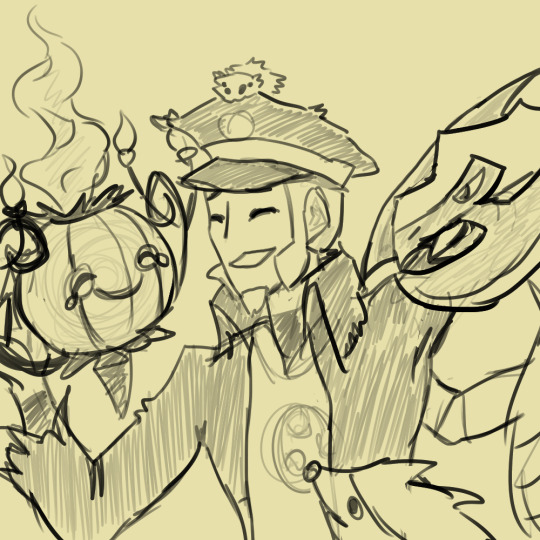
Ingo reunites with his pokemon :')
Thank you for the prompt @psychic-panda-28
haha umm this took a little longer cause i decided to draw his pokemon too (i got lazy and didn't look at refs for excadril, so please don't look too closely at him) (also a joltik is there because I'm sure that with all of the ones that Emmet has, he as some he's attached to too)
172 notes - Posted May 2, 2022
#4

When your brother returns after suddenly and unexpectedly disappearing into the past, and you cling to him like a koala cause you missed him so much and dont want him to disappear again
But it's fine cause he came back JACKED, and holding you is like holding a bunch of grapes
Bonus
See the full post
410 notes - Posted April 6, 2022
#3
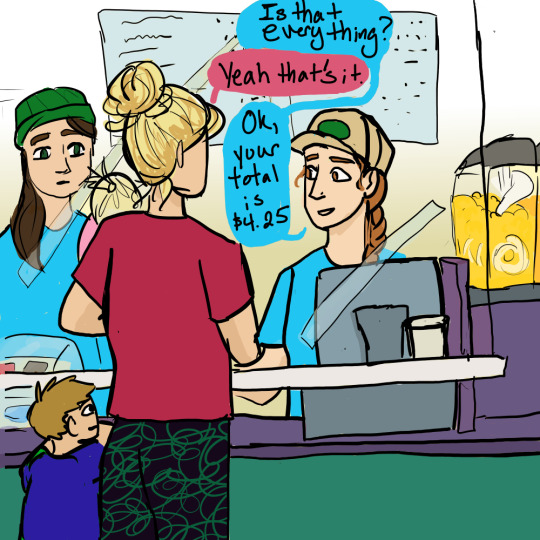
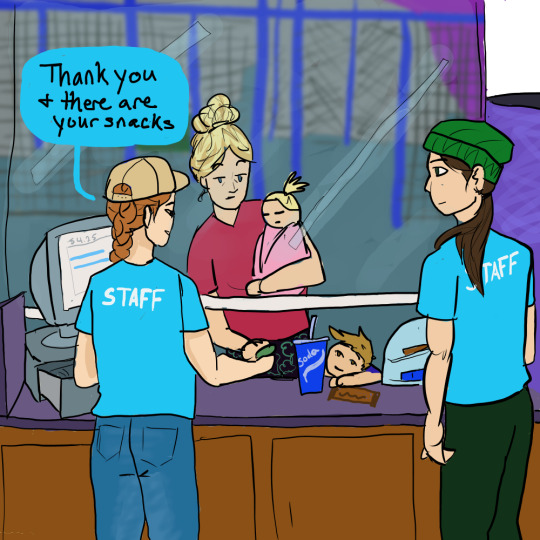
See the full post
639 notes - Posted February 16, 2022
#2
You ever like. Listen to songs and make them all about your current interest?
But there's always a couple songs that are cool, but dont quite vibe/fit with your current interest
And then later, after acquiring a New Interest, listening to your music and hearing a one of those songs and going "Oh. OH. OOOOOOOHHH THIS FITS THIS PERFECTLY HOLY CRAP THIS SONG WAS JUST WAITING FOR THIS INTEREST!!!!"
809 notes - Posted May 2, 2022
My #1 post of 2022

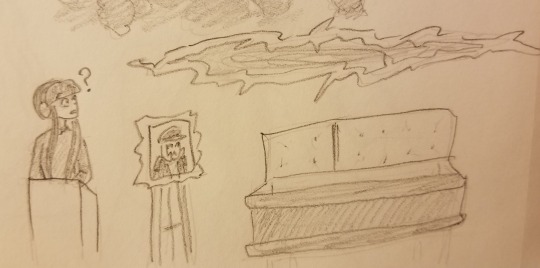
See the full post
2,164 notes - Posted May 11, 2022
Get your Tumblr 2022 Year in Review →
#tumblr2022#year in review#my 2022 tumblr year in review#your tumblr year in review#Oh wow submas really took over my life here huh?#Pfjdkdhsk#Okay what where the 6 posts that Ididnt add tags to???#I add tags to EVERYTHING#Hmm
5 notes
·
View notes
Text
Apparently this needs to be said so
Forgetting things is morally neutral! Memory issues are morally neutral!
You're not a bad person if you...
forget things quickly
forget people
can't remember entire stages of your life
can't remember important things
can remember some things very well and forget other things all the time
can't remember things (or anything!) about your interests
forget to eat, sleep, go to the bathroom, etc
forget to reply to texts
remember things and immediately forget them again
can't remember birthdays, events, etc
frequently answer 'I forgot' to questions
can't retain new information
forget things you used to know
only remember things when it's too late
have vague, distorted and/or unreliable memories
depend on others to know how an event you were in played out
have other symptoms that are worsened by memory issues and vice versa
... and anything else I might have missed!
#muted#memory issues#adhd#actually adhd#dissociative amnesia#amnesia#memory loss#dissociative identity disorder#what other things cause memory issues#ptsd#i can't think of anything else#reminder#positivity#neurodivergent#neurodivergent positivity#memory problems#ice speaks#i tried to include as many experiences as i could think of#but out of everything i tagged i only have adhd so i probably missed a lot of stuff#so feel free to add your own experiences!#brought to you by... uh ironically i can't remember what prompted me to write this#something my mom said. i don't remember what it was tho
17K notes
·
View notes
Text
god i love being SOOO obnoxious about my ocs everyone should be 50% more obnoxious about their ocs right neow
#starspeak#get obnoxious (oc tag)#ttrpgs#my campaigns#edit: everything after these tags are from the og post— they’re just kinda me ranting but i don’t wanna get rid of them#due to the fact that it adds how fucking funny it is that this post got popular and it was just. me rambeling#anyways.#->#literally guy who gave their character a whole birthday week and is celebrating him that whole week#like girl he’s fake……..just kidding cas is real To Me#this is fully positive there is NO self deprecation here i’m being dead serious#also i’m celebrating all week to hide the fact that this is the busiest week of the year at my work#and i’m already sick so it’s gonna be downhill from here 🥲#casboy’s gotta get me through it ok#not Sick sick i just don’t feel well. at least tmrw is my day off i probably need Rest#oops didn’t mean to rant a bit here but oh well. happy birthday week cas
12K notes
·
View notes
Text
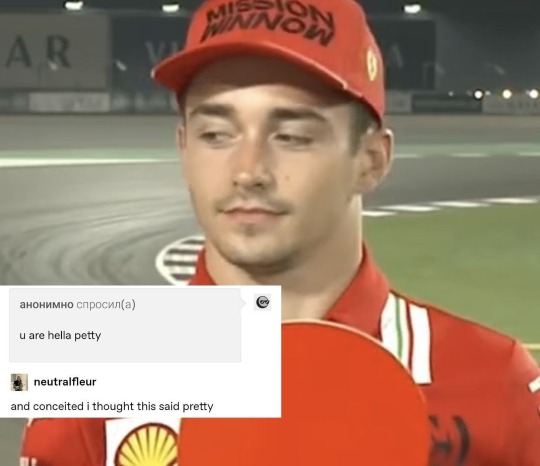
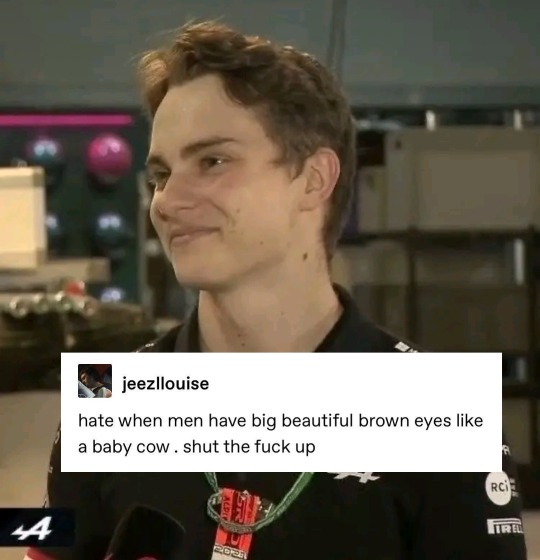




ive been making f1 drivers as tumblr posts and its highly entertaining to me
#theyre so silly all of them#most of them are leclerc bc hes just such a memeable guy 😭😭#f1#formula 1#f1 memes#f1 shitpost#oscar piastri#lando norris#charles leclerc#george russell#mctwinks#i know i add that tag to everything i just think its funny#sorry </3
1K notes
·
View notes
Note
Keep hearing people say maribug keep asking adricat if he's ok and he keep saying he's ok instead of telling her his problem but I don't remember it happened more than once in s4 in Rockettear but even then the circumstances of that episode did warrant the "nothing" answer he gave her unless he want to tell her that "nino tell me you let nino and alya know each other identity" which will reveal adricat identity. So when else did she ask? about the thing in hack-san, I think another credit goes to alya since she's the one who bring the topic to maribug who seems to be blissfully unaware that her leaving without telling adeicat that she send subtitute would be a problem.
I didn't get into this side of things in my other post because it was long and I wanted to focus on why Chat Noir's behavior was so frustrating, but this ask brings up the other big reason why the season four conflict was such a frustrating and terribly written plot line. Specifically, the part of your ask where you point out that Maribug seems blissfully unaware that her actions are having a negative impact on Chat Noir until someone points it out to her.
Yes, she is presented as blissfully unaware of this and every other interpersonal conflict we're given in season four. Your ask treats this as a failing on Maribug's part as if she should have obviously realized that she was in the wrong, but that's the whole problem. Telling kids - telling anyone really - that they should just magically know what others need is a frankly terrible life lesson as that's just not how the world works. You cannot just assume that everyone will have the same view of the world as you do and instantly pick up on the same issues as you do. That is the path to easily avoidable frustration and conflict. It also teaches people to assume that their view of the world is inherently correct when that is rarely the case. We often don't know the whole story and the other person's point of view may end up being equally or even more valid. This issue is extremely present in season four as Marinette has legitimate reasons to behave the way she does, which I'll get into in a bit.
If Marinette were written as feeling guilty about how she was treating Chat Noir, then this would be a different story. She'd be way more in the wrong and would shoulder a much greater portion of the blame. But as is? She has no idea that she's doing anything wrong. And until someone takes the time to tell her that her actions are causing harm, she is going to continue causing harm because she has no idea that she's causing harm.
In fact, I'd argue that the Alya thing in Hack San is a point in Maribug's favor. Throughout the episode, we see Marinette sending Alya messages on ways to be a good partner to Chat Noir, proving that she does in fact care about him. And then, as soon as Alya says, "You need to talk to Chat Noir," what does Maribug do?
She goes and talks to Chat Noir, giving him a pretty good apology for the problem she now knows she caused. Because, shockingly, Maribug doesn't actually want to hurt her partner. She also clearly cares about his feelings, making me want to take the season four conflict and tear it into itty bitty pieces because what is the conflict even supposed to be when you write shit like this?
I want to briefly step away from Miraculous and talk about this issue in a broader context via this YouTube short:
This short is from a Vietnamese woman who moved to Germany. Her YouTube channel is about her experiences there, including things like the short above which goes into the differences between what it means to be a dinner guest in Vietnam and what it means to be a dinner guest in Germany. In Vietnam, it's apparently standard for the guests to cook dinner with you where as, in Germany, you're expected to have the meal ready when the guests arrive, making this a situation where it's super easy to come across as rude just by doing what you think is normal.
Society is relatively aware that these types of culture clashes are a thing, but you don't have to be from different cultures to have these types of situations. Every person has their own unique needs and ideas of what "normal" is. The culture they were raised in will affect this, but so will their family, their personal needs, and many other factors. Two people can be raised on the same street and wind up with wildly different world views even though they supposedly share a culture. This is extra true when you add in compounding factors like neurodiversity, which is why it's an exercise in futility to say, "But Maribug should have realized..."
Well, she clearly didn't. And you can't change that she didn't realize whatever you're mad about. All you can do is have someone tell her what she's doing wrong. If she then continues the behavior, go ahead and judge away. But if she immediately corrects it like she did in Hack San? Doesn't that just prove that she truly didn't know that Chat Noir was hurting and would have probably fixed all of his problems if someone just pointed them out to her?
This is only exacerbated by the fact that Marinette's behavior in season four is largely unchanged from her behavior in previous seasons. The only major change is that she revealed her identity to Alya, but as soon as that's pointed out as a problem, she course corrects with an apology. After that, she thinks that everything is okay because why wouldn't she? Chat Noir said it was fine and everything else has been business as usual.
Bringing temp heroes into help as needed? That's been going on since season two. Having these additional members has been vital in multiple battles and there have been plenty of times where Chat Noir took a background role to the temp hero of the day like in Sapotis, Rena Rouge's season two debut. So why would Maribug suddenly think that this dynamic is a problem when it's been working fine for so long? We even had a whole episode about how Chat Noir was still needed in spite of the new heroes back in season three! Or, at least, I think that was Desperada's message? This show is shockingly bad at giving clear lessons.
Keeping guardian knowledge from Chat Noir? That's also been going on since season two and was even treated as a conflict that supposedly got resolved in the episode Syren which was the episode that ended with Master Fu coming to the mansion to talk to Adrien after everything was over.
When I watched that episode, I assumed this meant that Chat Noir was going to be more involved in things like picking the temp heroes. I actually thought this was how we were going to get Queen Bee because I knew she was going to be a thing, but it made no sense for Marinette to pick Chloe for a miraculous. Of course, I was wrong. Nothing changed after Syren. Chat Noir remained nothing more than the comic relief while Ladybug got all the insider info.
To be clear, I think that was a terrible move writing wise, but it doesn't change the fact that this is what they went with. This is the established dynamic. I can't even say that Alya learning Marinette's secret led to something new. She's just taken Marinette's old role while Marinette has taken on Master Fu's old role. This show loves it's status quo and Chat Noir has been at least tolerant of that status quo since Syren, so it's not surprising that Maribug doesn't register that this is a thing that should change and no one bothers to point it out to her even though she has a mentor in Tikki (and Su Han, I guess?) and a confidant in Alya and a whole slew of Kwamis who could also provide insight if they were allowed to do that sort of thing. (Sass and Wayzz were robbed of mentor roles.) Additional blame goes to Plagg because he should absolutely have told Adrien to talk to Ladybug. What is the point of giving these characters mentors who never mentor? It's aggravating in the extreme.
To circle back to the first part of your ask, outside of Hack San and Rocketear, I don't think there are any times when Ladybug invites feedback from Chat Noir unless you want to give credit to the end of Kuro Neko:
Cat Noir: (lands next to her) I've been a really temperamental kitty, m'lady. I didn't realize how much trouble I'd make for you by giving back my Miraculous.
Ladybug: (sits closer to him) Just because I don't need you all the time doesn't mean that I don't need you at all, Cat Noir. No one could ever replace you.
Which isn't Maribug inviting him to tell her what's up, but she is clearly willing to listen to him and reassure him, further backing up my point about this conflict being some of the worst writing I've ever had to suffer through. If Maribug always fixes the issue as soon as she learns about it, you are not writing a situation where she's clearly in the wrong. You are writing an easily solved communication issue where she gets blamed for something she clearly doesn't realize she's doing wrong and it is so frustrating!!! I feel so bad for her. The next episode is Penalteam, btw, which starts the battle with this gem:
Ladybug: (laughs) Nice scare tactics, but it's not gonna work. Cat Noir and I are the best at soccer!
Cat Noir: (Whispers to Ladybug) I don't know a thing about soccer M'lady. Maybe it's time to call the real team?
And basically just spends the whole episode making Chat Noir seems like a worthless partner while Maribug tries her best to make him - and everyone else - feel special.
Oh, and the episode before Kuro Neko? Well, it's technically Ephemeral, but that got magically overwritten so let's go one further back and we get to Dearest Family, which ends with this:
Cat Noir: (grabs a golden paper crown on the coffee table) Since I'm the king, (wears the crown on his head) would you be my queen, Ladybug?
Ladybug: With pleasure, kitty cat! Tradition is tradition!
Oh yes, these two are in such conflict and Maribug does nothing to validate Chat Noir. He's in pain every episode and she's just totally oblivious to it.
If that was what they wrote, then I'd probably agree that we needed more instances of her asking if Chat Noir was okay. But it's not what they wrote. If you look through the list of season four episodes, you'll find that less than half of them deal with the supposed conflict of the season (by my count, only 8 of the 24 episodes before the final actually showcase the conflict and they are not in a logical order in terms of escalation as I tried to demonstrate above). The rest of the episodes flat out ignore it or even straight up work against the conflict like when Ladybug says this to Chat Noir in Guilttrip: "I probably don't tell you this enough, but I couldn't do this without you. And it'd be a lot less fun too."
Seriously, what even is this season? What is the conflict supposed to be? Because it sure as shit isn't Maribug undervaluing Chat Noir, if memory servers, season four sees her validate him more times than any other season. And it isn't her guiltily hiding things from him like so many fanfics claim because we have multiple points of evidence that prove that she's completely oblivious that there even is a conflict. So what conflict are the writers actually trying to write?
What's even more baffling is that none of this logically leads to the loss at the end of the season:
Maribug's new secrets didn't lead to her downfall. The only reason she lost was because of the secret that's always been there - a fact that's never revealed to her - and a freaking evil twin! So why did it matter that Maribug was keeping secrets? This is made even worse by season five maintaining all of the secrets, once again begging the question of what lesson were we trying to teach here???
Chat Noir wasn't needed for the final fight of the season, Maribug only needed the powers of a few of the temp heroes to win, a baffling ending to a season whose focus was Chat Noir feeling unimportant. You could scrap that conflict entirely and the ending would not change. In fact....
Adrien quitting to be nothing more than a good little boy who obeys his father would have actually saved the world from eventually being rewritten. If you think about it, the season four final actually punishes Adrien for being defiant. So does season five as, if Chat Noir had quit, his father would still be alive. I thought this show was supposed to be a romcom, not a tragedy. Why is Adrien being punished for being a hero? Is this supposed to be karma for lying to Ladybug with the whole Catwalker thing?
This shit is why I say I'm a writing salt, character sugar blog. I can't get mad at the characters when they're in such a nonsense story where things never logically tie together. They all deserve so much better.
None of this is meant to imply that ignorance is a blanket excuse for hurting others. Nor is it meant to imply that you have to forgive someone who hurt you just because they didn't mean to. There's a ton of nuance around these topics. But season four acknowledges none of that nuance while creating a situation that desperately needed nuance because there was no clear right and wrong here. Should Maribug work to be more aware of others feelings? Sure, but that journey can only start after she's made aware of her faults and no one ever points them out to her. Does Chat Noir need to work on clearly communicating his needs? Desperately, but no one is teaching him that lesson so he remains a terrible communicator who suffers in silence. What impressively bad writing.
#ml writing critical#ml writing salt#adrien deserves better#marinette deserves better#kuro neko salt#my queendom for some good character arcs#and good story arcs#there's just so much squandered potential here#ml fandom salt#ml fandom critical#Adding those tags because I am sick of people holding Marinette to unrealistic expectations#This was long so I didn't add this part of the rant but:#It's important to remember how much we know as an audience vs what Maribug knows#Adrichat is really good at putting up a front that everything is fine#And Marinette knows nothing about his homelife when he's Chat Noir#Plus the show has made this kids kinda terrible at understanding Adrien's home life
455 notes
·
View notes
Text

but if red robin had tapetum lucidum?
sketch/doodle dump, v mild nsft
i was having a mid-wip crisis so i drew tim in club fits to console myself
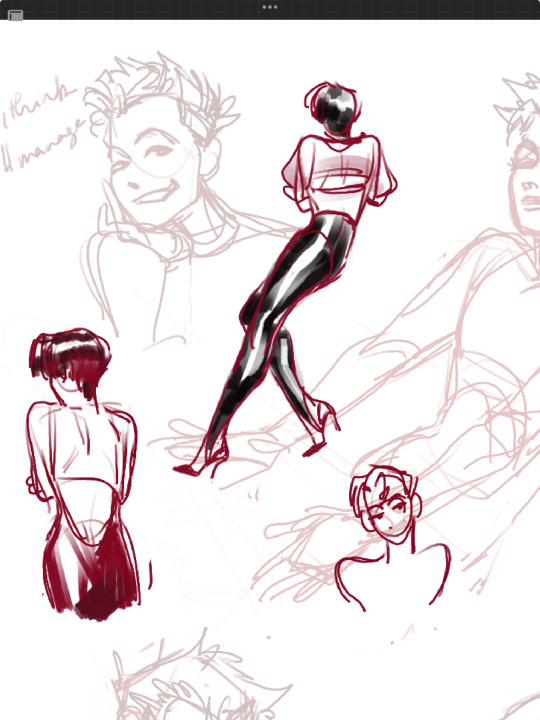
lighting experiment w dickie

tims


i think a cat wouldve fixed him post botc (lol probably not but probs wouldve helped)

wont stop putting tim in nightwing merch o7
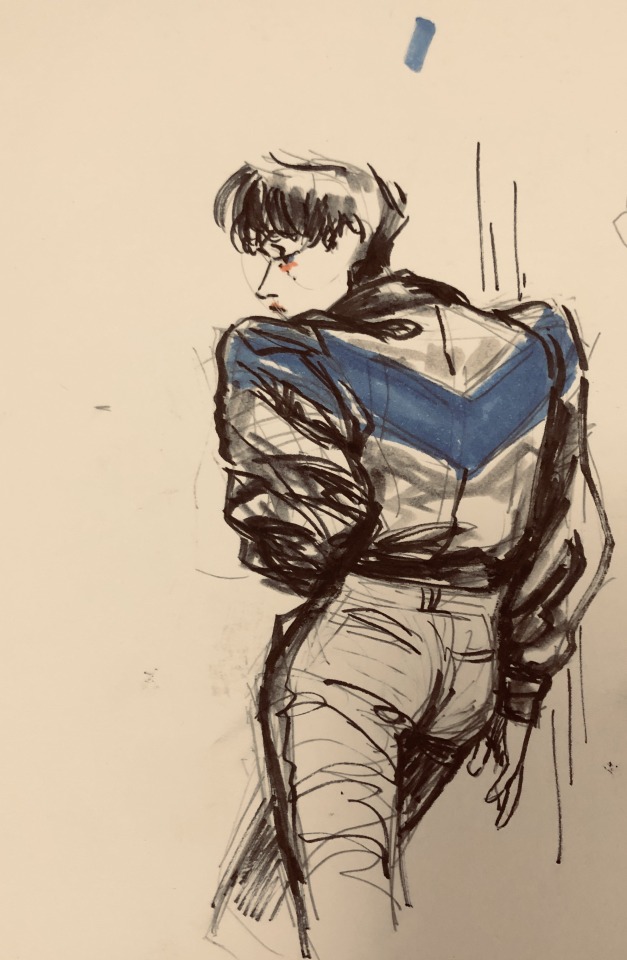
bb tim in a bunny onesie, dick head shot then yennefer, tim and an oc

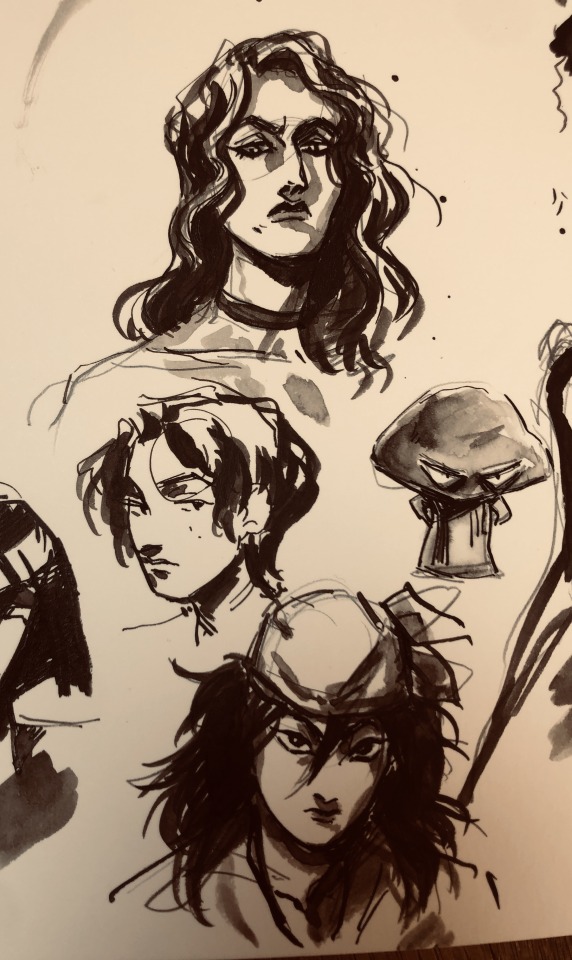
bb dickie, sketch of dilf dick
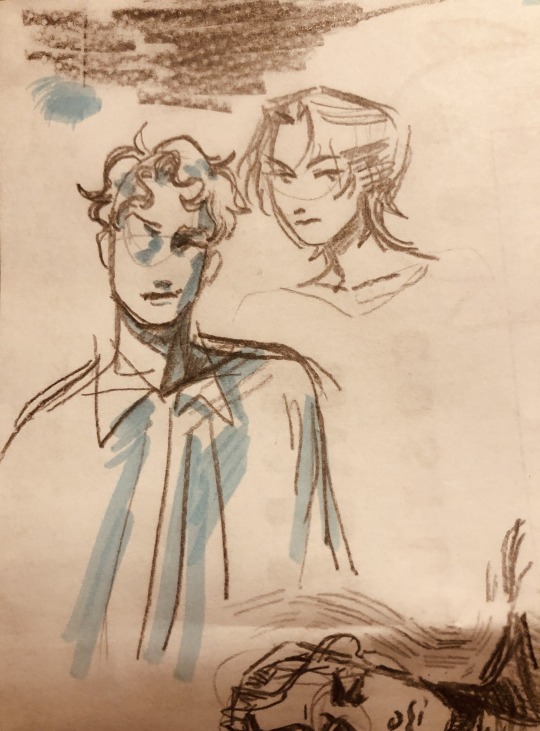
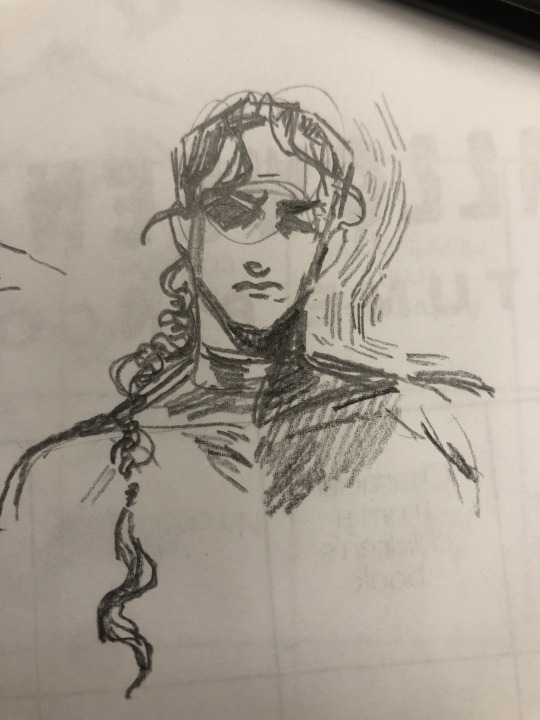
for the folks who liked tim in latex lol, these exist (i might clean them up eventually but eh):
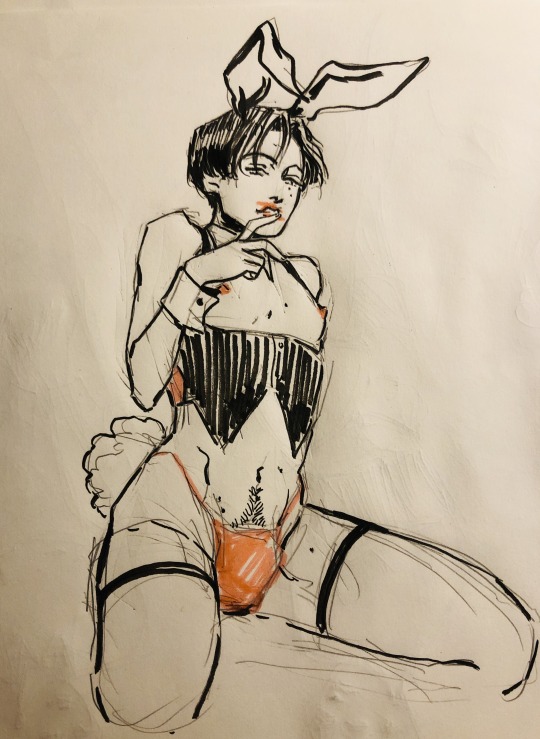
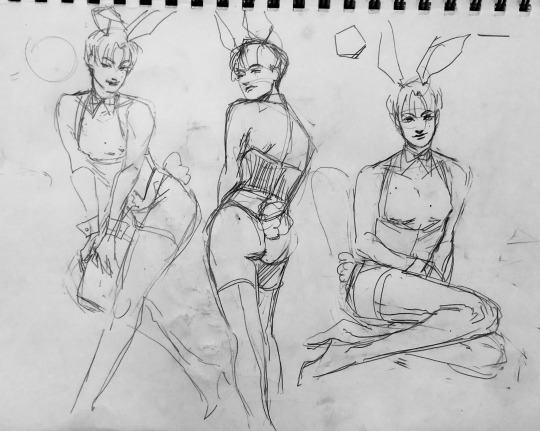
a wip im trynna muster up the energy to work on
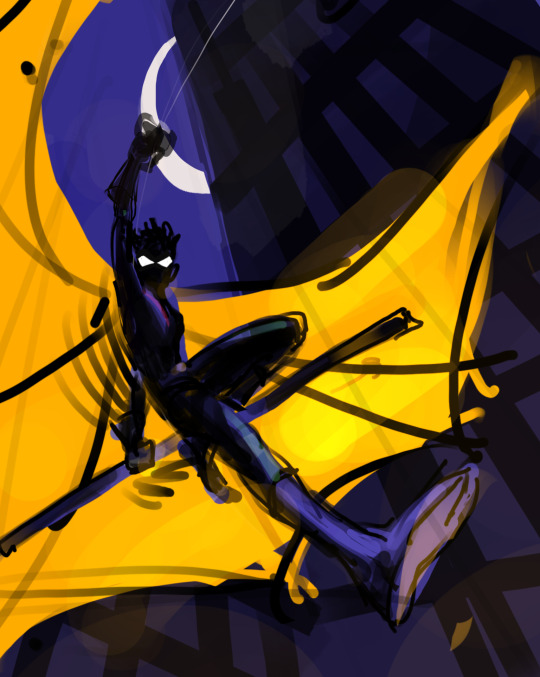
#tim drake#dc#sart#dick grayson#yen is in here but i'd feel bad tagging her#anyway yeah tim should have weird contacts to add to rr's Eeriness#i binged s classes that i raised and i remembered the webtoon black silhouette + eery eyes thing#and as with everything w my life recently i was like: but if this was tim?
588 notes
·
View notes
Text
Double Indemnity, Veritas Ratio and Aventurine

This was originally a part of my compilation post as a short analysis on the Double Indemnity references, linking to this great thread by Manya on Twitter. However, I've recently watched the movie and found that the parallels run much deeper than just the mission name and the light cone itself, plus as the short synopsis I've read online. Since there isn't really an in-depth attempt at an analysis on the film in relation to the way Aventurine and Ratio present themselves throughout Penacony, I thought I'd take a stab at doing just that. I will also be bringing up things from Manya's thread as well as another thread that has some extra points.
Disclaimer that I... don't do analyses very often. Or write, in general — I'm someone who likes to illustrate their thoughts (in the artistic sense) more than write. There's just something about these two that makes me want to rip into them so badly, so here we are. If there's anything you'd like to add or correct me on, feel free to let me know in the replies or reblogs, or asks. This ended up being a rather extensive deep dive into the movie and its influences on the pairing, so please keep that in mind when pressing Read More.
There are two distinct layers on display in Ratio and Aventurine's relationship throughout Penacony, which are references to the two most important relationships in the movie — where they act like they hate/don’t know each other, and where they trust each other.
SPOILER WARNING for the entire movie, by the way. You can watch the film for free here on archive.org, as well as follow along with the screenplay here. I will also be taking dialogue and such from the screenplay, and cite quotes from the original novel in its own dedicated section. SPOILER WARNING for the Cat Among Pigeons Trailblaze mission, as well.

CONTENT WARNING FOR MENTIONS OF SUICIDE. YOU HAVE BEEN WARNED.
To start, Double Indemnity (1944) is a film noir by Billy Wilder (and co-written by Raymond Chandler) based on the novel of the same name by James M. Cain (1927). There are stark differences between the movie adaptation and the original novel which I will get into later on in this post, albeit in a smaller section, as this analysis is mainly focused on the movie adaptation. I will talk about the basics (summaries for the movie and the game, specifically the Penacony mission in tandem with Ratio and Aventurine) before diving into the character and scene parallels, among other things.

—
[THE NAME]
The term "double indemnity" is a clause in which if there’s a case of accidental death of a statistically rare variety, the insurance company has to pay out multiple of the original amount. This excludes deaths by murder, suicide, gross negligence, and natural causes.

The part of the mission in Cat Among Pigeons where Ratio and Aventurine meet with Sunday is named after the movie. And before we get further into things, let's get this part out of the way: The Chinese name used in the mission is the CN title of the movie, so there's no liberties taken with the localization — this makes it clear that it’s a nod to the movie and not localization doing its own thing like with the mission name for Heaven Is A Place On Earth (EN) / This Side of Paradise (人间天堂) (CN).

—
[SUMMARY OF THE 1944 MOVIE]
Here I summarised the important parts that will eventually be relevant in the analysis related to the game.

Insurance salesman Walter Neff, wounded from a gunshot, enters his office and confesses his crime on a dictaphone to his boss Barton Keyes, the claims manager. Much earlier, he had met Phyllis Dietrichson, the wife of Mr. Dietrichson and former nurse. Neff had initially wanted to meet Mr. Dietrichson because of car insurance. Phyllis claims her husband is mean to her and that his life insurance goes to his daughter Lola. With Neff seduced by Phyllis, they eventually brew up a scheme to murder Mr. Dietrichson in such a way that they activate the "double indemnity" clause, and the plan goes off almost perfectly. Initially, the death is labeled a suicide by the president of the company, Norton.
Keyes finds the whole situation suspicious, and starts to suspect Phyllis may have had an accomplice. The label on the death goes from accidental, to suicide, to then murder. When it’s ruled that the husband had no idea of the accidental policy, the company refuses to pay. Neff befriends Phyllis’ stepdaughter Lola, and after finding out Phyllis may have played a part in the death of her father’s previous wife, Neff begins to fear for Lola and himself, as the life insurance would go all towards her, not Phyllis.
After the plan begins to unravel as a witness is found, it comes out that Lola’s boyfriend Nino Zachette has been visiting Phyllis every night after the murder. Neff goes to confront Phyllis, intending to kill her. Phyllis has her own plans, and ends up shooting him, but is unable to fire any more shots once she realises she did love him. Neff kills her in two shots. Soon after telling Zachette not to go inside the house, Neff drives to his office to record the confession. When Keyes arrives, Neff tells him he will go to Mexico, but he collapses before he could get out of the building.
—
[THE PENACONY MISSION TIMELINE]

I won’t be summarising the entirety of Aventurine and Ratio’s endeavours from the beginning of their relationship to their final conversation in Heaven Is A Place On Earth the same way as I summarised the plot of the movie, so I will instead present a timeline. Bolded parts means they are important and have clear parallels, and texts that are in [brackets] and italics stand for the names of either the light cone, or the mission names.
[Final Victor] Their first meeting. Ratio’s ideals are turned on its head as he finally meets his match.
Several missions happen in-between their first encounter and the Penacony project. They come to grow so close and trusting with each other that they can guess, understand each other’s thoughts, way of thinking and minds even in high stakes missions. Enough to pull off the Prisoner’s Dilemma (Aventurine’s E1) and Stag Hunt Game (Aventurine’s E6) and come out on top.
Aventurine turns towards Ratio for assisting him in the Penacony project. Ratio's involvement in the project is implied to be done without the knowledge of Jade, Topaz, and the IPC in general, as he was only sent to Penacony to represent the Intelligentsia Guild, and the two other Stonehearts never mention Ratio.
Aventurine and Ratio cook up the plan to deceive Sunday before ever setting foot on Penacony. Aventurine does not tell Ratio the entirety of his plan.
Aventurine convinces Topaz and Jade to trust him with their Cornerstones. Aventurine also breaks his own Cornerstone and hides it along with the jade within a bag of gift money.
[The Youth Who Chase Dreams] They enter Penacony in the Reverie Hotel. Aventurine is taken to the side by Sunday and has all his valuables taken, which includes the gift money that contains the broken aventurine stone, the jade, and the case containing the topaz.
Aventurine and Ratio speak in a “private” room about how Aventurine messed up the plan. After faking an argument to the all-seeing eyes of Sunday, Ratio leaves in a huff.
Ratio, wearing his alabaster head, is seen around Golden Hour in the (Dusk) Auction House by March 7th.
[Double Indemnity] Ratio meets up with Sunday and “exposes” Aventurine to him. Sunday buys his “betrayal”, and is now in possession of the topaz and jade. Note that this is in truth Ratio betraying Sunday all along.
Ratio meets up with Aventurine again at the bar. Ratio tells Aventurine Sunday wants to see him again.
They go to Dewlight Pavilion and solve a bunch of puzzles to prove their worth to Sunday.
They meet up with Sunday. Sunday forces Aventurine to tell the truth using his Harmony powers. Ratio cannot watch on. It ends with Aventurine taking the gift money with his Cornerstone.
[Heaven Is A Place On Earth] They are in Golden Hour. Ratio tries to pry Aventurine about his plan, but Aventurine reins him in to stop breaking character. Ratio gives him the Mundanite’s Insight before leaving. This is their final conversation before Aventurine’s grandest death.
Now how exactly does the word “double indemnity” relate to their mission in-game? What is their payout? For the IPC, this would be Penacony itself — Aventurine, as the IPC ambassador, handing in the Jade Cornerstone as well as orchestrating a huge show for everybody to witness his death, means the IPC have a reason to reclaim the former prison frontier. As for Ratio, his payout would be information on Penacony’s Stellaron, although whether or not this was actually something he sought out is debatable. And Aventurine? It’s highly implied that he seeks an audience with Diamond, and breaking the Aventurine Cornerstone is a one way trip to getting into hot water with Diamond. With Aventurine’s self-destructive behaviour, however, it would also make sense to say that death would be his potential payout, had he taken that path in the realm of IX.
Compared to the movie, the timeline happens in reverse and opposite in some aspects. I will get into it later. As for the intended parallels, these are pretty clear and cut:
Veritas Ratio - Walter Neff
Aventurine - Phyllis Dietrichson
Sunday - Mr. Dietrichson

There is one other character who I feel also is represented in Ratio, but I won’t bring them up until later down the line.
For the sake of this analysis, I won’t be exploring Sunday’s parallel to Mr. Dietrichson, as there isn’t much on Dietrichson’s character in the first place in both the movie and the novel. He just kind of exists to be a bastard that is killed off at the halfway point. Plus, the analysis is specifically hyper focused on the other two.
—
[SO, WHAT’S THE PLAN?]
To make things less confusing in the long run whenever I mention the words “scheme” and “plan”, I will be going through the details of Phyllis and Neff’s scheme, and Aventurine and Ratio’s plan respectively. Anything that happens after either pair separate from another isn’t going to be included. Written in a way for the plans to have gone perfectly with no outside problems.

Phyllis and Neff —> Mr. Dietrichson
Goal: Activate the double indemnity clause by killing Mr. Dietrichson and making it look like a freak train accident
Payout: Twice or more of the face value of the life insurance ($100,000)
Main Actor: Walter Neff | Accomplice: Phyllis Dietrichson
During the entire time until the payout, Phyllis and Neff have to make sure to any outsiders that they look like complete strangers instead of lovers in an affair.
Step-by-step:
Neff convinces Mr. Dietrichson to sign the policy with the clause without him suspecting foul play, preferably with a third party to act as an alibi. This is done discreetly, making Mr. Dietrichson not read the policy closely and being told to just sign.
Neff and Phyllis talk to each other about small details through the phone (specified to be never at Phyllis’ own house and never when Neff was in his office) and in the marketplace only, to make their meetings look accidental. They shouldn’t be seen nor tracked together, after all.
Phyllis asks Mr. Dietrichson to take the train. She will be the one driving him to the train station.
On the night of the murder, after making sure his alibi is airtight, Neff sneaks into their residence and hides in their car in the second row seating, behind the front row passenger seat. He wears the same colour of clothes as Mr. Dietrichson.
Phyllis and Mr. Dietrichson get inside the car — Phyllis in the driver’s seat and Mr. Dietrichson in the passenger seat. Phyllis drives. On the way to the train station, she makes a detour into an alley. She honks the horn three times.
After the third honk, Neff breaks Mr. Dietrichson’s neck. The body is then hidden in the second row seating under a rug.
They drive to the train station. Phyllis helps Neff, now posing as Mr. Dietrichson, onto the train. The train leaves the station.
Neff makes it to the observation platform of the parlour car and drops onto the train tracks when nobody else is there.
Phyllis is at the dump beside the tracks. She makes the car blink twice as a signal.
The two drag Mr. Dietrichson’s corpse onto the tracks.
They leave.
When Phyllis eventually gets questioned by the insurance company, she pretends she has no idea what they are talking about and eventually storms off.
Phyllis and Neff continue to lay low until the insurance company pays out.
Profit!
Actual Result: The actual murder plan goes almost smoothly, with a bonus of Mr. Dietrichson having broken a leg. But with him not filing a claim for the broken leg, a witness at the observation platform, and Zachette visiting Phyllis every night after the murder, Keyes works out the murder scheme on his own, but pins the blame on Phyllis and Zachette, not Neff.

Now for Aventurine and Ratio. You can skip this section if you understand how deep their act goes, but to those who need a refresher, here’s a thorough explanation:
Aventurine and Ratio —> Sunday
Goal: Collect the aventurine stone without Sunday knowing, ruin the dream (and create the grandest death)
Payout: Penacony for the IPC, information on the Stellaron for Ratio, a meeting with Diamond / death for Aventurine
Main Actor: Aventurine | Accomplice: Veritas Ratio
From the moment they step onto Penacony, they are under Sunday’s ever present and watchful eyes. “Privacy” is a foreign word to The Family. They have to act like they don’t like each other’s company the entire time and feed Sunday information through indirect means so that the eventual “betrayal” by Ratio seems truthful to Sunday. Despite what it looks like, they are closer than one would ever think, and Ratio would never sell out a person purely for information.
Step-by-step:
After Sunday takes away the bag of gift money and box, Aventurine and Ratio talk in a room in the Reverie Hotel.
Aventurine establishes the Cornerstones’ importance, and how he lost the gift money and the case containing the Cornerstones to Sunday. Ratio turns to leave, saying “some idiot ruined everything”, meaning the Cornerstones were vital to their plan. (Note that Ratio is not wearing his alabaster head while saying it to said “idiot”.)
Aventurine then proceeds to downplay the importance of the Cornerstones, stating they are “nothing more than a few rocks” and “who cares if they are gone”. This lets Sunday know that something suspicious may be going on for him to act like it’s nothing, and the mention of multiple stones, and leaves him to look up what a Cornerstone is to the Ten Stonehearts of the IPC.
Ratio points out his absurd choice of outfit, mentioning the Attini Peacock and their song.
Ratio implies that without the aventurine stone, he is useless to the IPC. He also establishes that Aventurine is from Sigonia(-IV), and points out the mark on his neck. To Sunday, this means that Aventurine is shackled to the IPC, and how Aventurine may possibly go through extreme lengths to get the stone back, because a death sentence always looms above him.
Aventurine claims Ratio had done his homework on his background, which can be taken that this is their very first time working together. (It isn’t, and it only takes one look to know that Aventurine is an Avgin because of his unique eyes, so this comment does not make sense even in a “sincere” way, a running theme for the interaction.)
Ratio mentions how the true goal is to reclaim Penacony for the IPC, establishing their ulterior motive for attending the banquet.
Ratio asks if Aventurine went to pre-school in Sigonia after saying trust was reliant on cooperation. Aventurine mentions how he didn’t go to school and how he doesn’t have any parents. He even brings up how friends are weapons of the Avgins. This tells Sunday that the Avgins supposedly are good at manipulation and potentially sees Ratio possibly betraying Aventurine due to his carelessness with his “friends”. Sunday would also then research about the Avgins in general (and research about Sigonia-IV comes straight from the Intelligentsia Guild.)
Ratio goes to Dewlight Pavilion in Sunday’s Mansion and exposes a part of Aventurine’s “plan”. When being handed the suitcase, Ratio opens it up due to his apparent high status in the IPC. He tells Sunday that the Cornerstone in the suitcase is a topaz, not an aventurine, and that the real aventurine stone is in the bag of gift money. This is a double betrayal — on Aventurine (who knows) and Sunday (who doesn’t). Note that while Ratio is not officially an IPC member in name — the Intelligentsia Guild (which is run by the IPC head of the Technology Department Yabuli) frequently collaborates with the IPC. Either Aventurine had given him access to the box, or Ratio’s status in general is ambiguous enough for Sunday not to question him further. He then explains parts of Aventurine’s gamble to Sunday in order to sell the betrayal. Note that Ratio does not ever mention Aventurine’s race to Sunday.
Ratio brings Aventurine to Sunday. Aventurine offers help in the investigation of Robin's death, requesting the gift money and the box in return.
Sunday objects to the trade offer. Aventurine then asks for just the bag. A classic car insurance sales tactic. Sunday then interrogates Aventurine, and uses everything Ratio and Aventurine brought up in the Reverie Hotel conversation and their interactions in the Mansion, as well as aspects that Ratio had brought up to Sunday himself.
Aventurine feigns defeat and ignorance enough so that Sunday willingly lets him go with the gift bag. After all is said and done, Aventurine leaves with the gift money, where the Aventurine Cornerstone is stored all along.
Ratio and Aventurine continue to pretend they dislike each other until they go their separate ways for their respective goals and plans. Aventurine would go on to orchestrate his own demise at the hands of Acheron, and Ratio… lurks in the shadows like the owl he is.
Profit!
Actual Result: The plan goes perfectly, even with minor hiccups like Ratio coming close to breaking character several times and Aventurine being sentenced to execution by Sunday.
This is how Sunday uses the information he gathered against Aventurine:
• Sunday going on a tirade about the way Aventurine dresses and how he’s not one to take risks — Ratio’s comment about Aventurine’s outfit being peacock-esque and how he’s “short of a feather or two”.
• “Do you own a Cornerstone?” — Ratio talked about the aventurine stone.
• “Did you hand over the Cornerstone to The Family when you entered Penacony?” — Aventurine mentioned the box containing the Cornerstones.
• “Does the Cornerstone you handed over to The Family belong to you?” — Aventurine specifically pluralized the word Cornerstone and “a bunch of rocks” when talking to Ratio.
• “Is your Cornerstone in this room right now?” — The box in the room supposedly contained Aventurine’s own cornerstone, when Aventurine mentioned multiple stones.
• “Are you an Avgin from Sigonia?” —Aventurine mentioned that he’s an Avgin, and Ratio brought up Sigonia.
• “Do the Avgins have any ability to read, control, and manipulate one’s own or another’s minds?” — Aventurine’s comment on how friends are weapons, as well as Sunday’s own research on the Avgins, leading him to find out about the negative stereotypes associated with them.
• “Do you love your family more than yourself?” — His lost parents.
“All the Avgins were killed in a massacre. Am I right?” — Based on Sunday’s research into his background.
• “Are you your clan’s sole survivor?” — Same as the last point.
“Do you hate and wish to destroy this world with your own hands?” — Ratio mentioned the IPC’s goal to regain Penacony, and Aventurine’s whole shtick is “all or nothing”.
• “Can you swear that at this very moment, the aventurine stone is safe and sound in this box?” — Repeat.
As seen here, both duos have convoluted plans that involve the deception of one or more parties while also pretending that the relationship between each other isn’t as close as in reality. Unless you knew both of them personally and their histories, there was no way you could tell that they have something else going on.
On to the next point: Comparing Aventurine and Ratio with Phyllis and Neff.
—
[NEFF & PHYLLIS — RATIO & AVENTURINE]

With the short summaries of the movie and the mission out of the way, let’s look at Phyllis and Neff as characters and how Aventurine and Ratio are similar or opposite to them.

Starting off with Aventurine and Phyllis. Here is where they are the most similar:
Phyllis is blonde and described as a provocative woman. Aventurine is also a blond and eyes Ratio provocatively in the Final Victor light cone.
Phyllis was put under surveillance after Keyes starts figuring out that the so-called accidental death/suicide may have been a murder after all. Similarly, Aventurine was watched by Sunday the entire time in Penacony.
Phyllis never tells Neff how she's seeing another man on the side to possibly kill him too (as well as how she was responsible for the death of her husband‘s previous wife). Aventurine also didn't tell Ratio the entirety of his plan of his own death.
Phyllis puts on a somewhat helpless act at first but is incredibly capable of making things go her way, having everything seemingly wrapped around her finger. Aventurine — even when putting on a facade that masks his true motives — always comes out at the top.
Now the differences between Aventurine and Phyllis:
Phyllis does not care about her family and has no issue with killing her husband, his previous wife, and possibly her daughter Lola. Opposite of that, Aventurine is a family man… with no family left, as well as feeling an insane level of survivor’s guilt.
Really, Phyllis just… does not care at all about anyone but herself and the money. Aventurine, while he uses every trick in the book to get out on top, does care about the way Jade and Topaz had entrusted him with their Cornerstones, in spite of the stones being worth their lives.
Phyllis also uses other people to her advantage to get what she wants, often behind other people's backs, with the way she treats Neff and Zachette. Aventurine does as well (what with him making deals with the Trailblazer while also making a deal with Black Swan that involves the Trailblazer). The difference here is Phyllis uses her allure deliberately to seduce men while Aventurine simply uses others as pawns while also allowing others to do the same to himself.
Phyllis makes no attempt at compromising the policy when questioned by Norton. Aventurine ends up compromising by only taking the gift money (which is exactly what he needs).
The wig that Barbara Stanwyck (the actress of Phyllis) wore was chosen to make her look as “sleazy” as possible, make her look insincere and a fraud, a manipulator. A sort of cheapness. Aventurine’s flashy peacock-esque outfit can be sort of seen as something similar, except the outfit isn’t cheap.

Moving on to Ratio’s similarities to Neff… There isn’t much to extrapolate here as Ratio is more of a side character in the grand scheme of Penacony, however this is what I’ve figured out.
Neff has dark hair. Ratio has dark purple hair.
Neff almost never refers to Phyllis by her name when speaking with her, only as “baby”. The few times he refers to her as Phyllis or Mrs. Dietrichson is during their first conversations and when he has to act like he doesn’t know her. Ratio never calls Aventurine by his name when he’s around him — only as “gambler”, sometimes “damned” or “dear” (EN-only) gambler. Only in the Aventurine's Keeping Up With Star Rail episode does Ratio repeatedly say his name, and yet he still calls him by monikers like “gambler” or, bafflingly, a “system of chaos devoid of logic”.
Both Neff and Ratio committed two betrayals: Neff on Mr. Dietrichson and Keyes, and Ratio on Sunday and Aventurine. With the former cases it was to reach the end of the trolley line, and with the latter it was on a man who had put his trust in him.
As for the differences…
Neff is described as someone who’s not smart by his peers. Ratio is someone who is repeatedly idolised and put on a pedestal by other people.
Neff is excellent at pretending to not know nor care for Phyllis whenever he speaks about her with Keyes or when he and she are in a place that could land them in hot water (the office, the mansion when there are witnesses). His acting is on the same level as Phyllis. With Ratio it’s… complicated. While he does pull off the hater act well, he straight up isn’t great at pretending not to care about Aventurine’s wellbeing.
Instead of getting his gunshot wound treated in the hospital like a normal person, Neff makes the absolutely brilliant decision of driving to his office and talking to a dictaphone for hours. Needless to say, this is something a medical doctor like Ratio would never do.

Now here's the thing. Though it's very easy to just look at Phyllis and Neff in the movie and go "okay, Aventurine is Phyllis and Ratio is Neff — end of story" and leave it at that, I find that they both take from the two leads in different ways. Let me explain. Beginning with Aventurine and Neff…
Neff is the one who hatches the plan and encourages Phyllis to go through and claim the double indemnity clause in the first place. He is also the key player of his own risky plan, having to fake being the husband to enter the train as well as fake the death. Aventurine puts himself at great risk just by being in Sunday’s presence, and hoping that Sunday wouldn’t figure out that the green stone he had uncovered wasn’t the aventurine stone.
Adding onto the last point, Neff had fantasised about pulling off the perfect murder for a long time — the catalyst was simply him meeting Phyllis. Aventurine presumably sought out Ratio alone for his plan against Sunday.
Neff makes a roulette wheel analogy and talks about a pile of blue and yellow poker chips (the latter in the script only). I don‘t even have to explain why this is relevant here. (Aventurine’s Ultimate features a roulette wheel and the motif is on his belt, thigh strap, and back, too. And of course, Aventurine is all about his chips.)
Neff has certain ways to hide when he’s nervous, which include hiding his hands in his pockets when they were shaking, putting on glasses so people couldn’t see his eyes. Aventurine hides his left hand behind his back when he’s nervous: Future Aventurine says that "they don't know the other hand is below the table, clutching [his] chips for dear life", and in multiple occasions such as the Final Victor LC, his character trailer, and even in his boss form in the overworld you can see that Aventurine hides his left hand behind his back. And he is also seen with his glasses on sometimes.
Neff says a bunch of stuff to make sure that Phyllis acts her part and does not act out of character (i.e. during their interactions at the market), like how Aventurine repeatedly tries to get Ratio back on track from his subpar acting.
Neff is always one step ahead of the game, and the only reason the plan blows up in his face is due to outside forces that he could not have foreseen (a witness, Keyes figuring out the plan, the broken leg). Aventurine meanwhile plays 5D chess and even with the odds against him, he uses everything he can to come out on the top (i. e. getting Acheron to kill him in the dream).
Even after coming home on the night of the murder, Neff still felt that everything could have gone wrong. Aventurine, with his blessed luck, occasionally wavers and fears everything could go wrong whenever he takes a gamble.
Neff was not put under surveillance by Keyes due to him being extensive with his alibi. After witnessing Robin’s death with eyewitnesses at the scene, the Family had accepted Aventurine’s alibi, though he would be under watch from the Bloodhounds according to Ratio.
Neff talks about the entire murder scheme to the dictaphone. Aventurine during Cat Among Pigeons also retells his plan, albeit in a more convoluted manner, what with his future self and all.

Continuing with Ratio and Phyllis, even with their personalities and motivations being quite different, they do have a few commonalities.
Phyllis was a nurse. Ratio is a medical doctor.
Her name is Greek of origin. Veritas Ratio, though his name is Latin, has Greco-Roman influences throughout his entire character.
The very first scene Phyllis appears in has her wearing a bath towel around her torso. Ratio loves to take baths to clear his mind.
Phyllis was instructed by Neff to be at the market every morning at eleven buying things. Ratio is seen in an auction house with his alabaster head on so no one could recognize him.
Phyllis mostly acts as an accomplice to the scheme, being the one to convince her husband to take the train instead. She is also generally seen only when Neff is involved. Ratio plays the same role as well, only really appearing in the story in relation to Aventurine as well as being the accomplice in Aventurine’s own death. Even him standing in the auction house randomly can be explained by the theory that he and Aventurine had attempted to destabilise Penacony’s economy through a pump and dump scheme.
With these pointers out of the way, let’s take a closer look at select scenes from the film and their relation to the mission and the pair.
—
[THE PHONE CALL — THE REVERIE HOTEL]

Before the murder, there is a scene with a phone call between Phyllis and Neff discussing the plan while Keyes is in the same room as Neff. Neff has to make sure that Keyes doesn’t think of anything of the phone call, so he acts like he’s calling a “Margie”, and says a bunch of stuff that sounds innocent out of context (“Can’t I call you back, ‘Margie’?” “What color did you pick out?” “Navy blue. I like that fine”), but are actually hinting at the real plan all along (the suit that Mr. Dietrichson wears.)
In a roundabout way, the conversation between Ratio and Aventurine in the Reverie Hotel can be seen as the opposite of that scene — with the two talking about their supposed plan out loud on Penacony ground, a place where the Family (and in turn, Sunday) has eyes everywhere. Despite being in a “private” room, they still act like they hate each other while airing out details that really do not make sense to air out if they really did meet the first time in Penacony (which they didn’t — they’ve been on several missions beforehand). It’s almost like they want a secret third person to know what they were doing, instead of trying to be hushed up about it. The TVs in the room that Sunday can look through based on Inherently Unjust Destiny — A Moment Among The Stars, the Bloodhound statue that disappears upon being inspected, the owl clock on the left which side eyes Ratio and Aventurine, all point to that Sunday is watching their every move, listening to every word.
Rewinding back to before the phone call, in one of the encounters at the marketplace where they “accidentally” run into each other, Phyllis talks about how the trip was off. How her husband wouldn’t get on the train, which was vital for their plan, because of a broken leg. All this, while pretending to be strangers by the passersby. You could say that the part where Ratio almost leaves because Aventurine had “ruined the plan” is the opposite of this, as the husband breaking his leg was something they couldn’t account for, while Aventurine “being short of a few feathers” was entirely part of the plan.
—
[QUESTIONING PHYLLIS — THE INTERROGATION]

This section is going to be a little longer as I will cover two scenes in the movie in a more detailed manner — Mr. Dietrichson signing the policy, and Phyllis being questioned — and how they are represented in the Sunday-Aventurine interrogation and the prior conversation between Ratio and Sunday in multitudes of ways.
Going about their plan, Neff has to make sure that Mr. Dietrichson signs the policy with the double indemnity clause without him knowing the details, all the while having Phyllis (and Lola) in the same room. He and Phyllis have to pretend that they don’t know each other, and that this is just the standard accidental insurance process, instead of signing what would be his downfall. To sell it, he gets Mr. Dietrichson to sign two “copies” of the form, except with Mr. Dietrichson’s second signature, he’s duped into signing the accident insurance policy with the respective clause.
You can tie this to how Ratio goes to Sunday in order to “expose” the lie that the suitcase didn’t actually contain the Aventurine Cornerstone, as well as there being more than one Cornerstone involved in the scheme. Ratio must make sure that Sunday truly believes that he dislikes Aventurine’s company, while also making sure that Sunday doesn’t figure out the actual aventurine stone is broken and hidden in the gift bag. The scheme turns out to be successful, as Sunday retrieves the two Cornerstones, but not the aventurine stone, and truly does think that the green stone he has in his possession is the aventurine.

This whole scene with Sunday is also reminiscent of the interrogation scene in the middle of the movie, where Phyllis was questioned by the boss (Norton) who was deducing that Mr. Dietrichson's death was a suicide, not accidental death. Neff, Phyllis, Keyes and Norton were all in the same room, and Neff and Phyllis had to act like they never knew the other. Phyllis acts like she knows nothing about what Norton insinuates about her husband and eventually, Phyllis explodes in anger and storms out the room, even slamming the door. Her act is very believable to any outsider.

Now back to the Ratio and Sunday conversation. One glaring difference between the movie and here is that his acting isn’t great compared to either Phyllis nor Neff. It never was throughout the Penacony mission. He even comes very close to breaking character several times, and is even defending Aventurine in a somewhat aggressive manner during his one-on-one conversation with Sunday, as in he literally tells Sunday to see a shrink. It’s very different from the way he was acting in Herta Space Station — like Ratio cares about Aventurine too much to keep his hands off.
It's also worth pointing out that Neff doesn't speak a word when Phyllis was being interrogated. Similarly, Ratio is silent throughout the entire scene with Sunday and Aventurine, with his only “line” being a “hm”. When Aventurine calls him a wretch to his face, all he does is look to the side. In fact, he can only look at Aventurine when the other isn’t staring back. Almost like him uttering a single word would give them away. Or his acting is terrible when it has to do with Aventurine, as he has no issue doing the same thing in Crown of the Mundane and Divine (Mundane Troubles).
So, Sunday finds out about the Cornerstones and reveals them to Aventurine, and reasons that he cannot give them back to him because Aventurine had lied. Note that in that same scene, Aventurine attempted to use the two murders that had occurred beforehand against Sunday to retrieve his own cornerstone. Similarly, when it was revealed that Mr. Dietrichson did not know about the accident policy and that the so-called “accidental death” was not, in fact, accidental, the insurance company refused to pay out the money.
Unlike the movie, this was all planned, however. The double-crossing by Ratio, the gift money being the only thing required for Aventurine’s real plan. All of it was an act of betrayal against Sunday, in the same manner as the meticulous planning as Mr. Dietrichson’s murder — To sign the policy, get him to take the train, kill him on the way, and to have Neff pose as the husband on the train until the time is right to get off and lay the body on the tracks. A key difference is that they could not have expected their scheme to be busted wide open due to forces outside of their control, while Ratio and Aventurine went straight down the line for the both of them no matter what.
From here on out, we can conclude that the way Ratio and Aventurine present themselves in Penacony to onlookers is in line with Neff and Phyllis.
—
[“GOODBYE, BABY” — FINAL VICTOR]

And now for the (in)famous light cone, Final Victor. The thing that truly kickstarted the Ratio and Aventurine ship in the fanbase, and the partnership between the two in general. It’s a direct reference to the final confrontation between Neff and Phyllis in the movie.
I’ll fire through all the similarities between the two scenes.
During the respective scenes, Aventurine and Phyllis both outsmart their partner one way or the other: Aventurine with his one-sided game of Russian Roulette, and Phyllis hiding her gun underneath the cushions until Neff turned away.
The guns are owned by Phyllis and Aventurine, not Neff and Ratio.
Phyllis couldn’t bring herself to fire any more shots after she realised she truly did love Neff. Ratio could do nothing but watch as Aventurine did what he did — he couldn’t even pull away if the LC animation is anything to go by him struggling as Aventurine firmly keeps the gun to his chest.
Neff says he doesn’t buy (believe) that Phyllis loved him. She then goes “I’m not asking you to buy […]”. The LC description has Aventurine ask Ratio “You don’t believe me?”, while in the LC animation Ratio straight up says “You expect me to believe you?” and Aventurine answering “Why not, doctor/professor?”
The visual composition of the LC and the scene are nearly identical, from the lighting to the posing to the way Aventurine looks at Ratio — Aventurine and Ratio are even wearing different outfits to fit the scene better. The background in the LC is also like the blinders in the movie, just horizontal.
In the shot where Phyllis’ face is more visible, the way she looks at Neff is strikingly like the way provocatively looks at Ratio. Even their eyes have a visible shine — Phyllis’ eyes brightly shining the moment she realised she really fell in love with Neff, and Aventurine having just a little light return to his eyes in that specific moment.
And now the differences!
Neff holds the gun in his right hand. Aventurine makes Ratio hold his gun in his left.
Neff is the one who takes the gun from Phyllis‘ hand. Aventurine is the one who places the gun in Ratio’s hand and fires it.
Three gunshots are fired. In the movie, Phyllis shoots the first shot and Neff the second and third. Aventurine unloads the gun and leaves only one bullet for this game of Russian Roulette. He pulls the trigger three times, but they all turn out to be blanks.
Phyllis does not break her façade of not smiling until the very last moment where she gets shot. Aventurine is smiling the entire time according to the light cone description, whilst in the animation, it’s only when he guides the gun to his chest that he puts it on.
So, you know how Neff meets Phyllis and it all goes off the rails from there. The way Neff goes from a decent guy to willingly involve himself in a murder scheme, having his morals corrupted by Phyllis. His world having been turned upside down the moment he lays eyes on Phyllis in that first meeting. Doesn’t that sound like something that happened with the Final Victor LC? Ratio, a man all about logic and rationality — a scholar with eight PhDs to his name — all of that is flipped on its head the moment Aventurine pulls out his gun in their first meeting and forces Ratio to play a game of Russian roulette with him. Aventurine casually gambles using his own life like it’s nothing and seemingly without fear (barring his hidden left hand). All or nothing — and yet Aventurine comes out alive after three blanks. Poetic, considering there’s a consumable in the game called “All or Nothing” which features a broken chess piece and a poker chip bound together by a tie. The poker chip obviously represents the gambler, but the chess piece specifically stands for Ratio because he plays chess in his character trailer, his Keeping Up With Star Rail episode and his introduction is centred around him playing chess with himself. Plus, the design of the chess piece has golden accents, similar to his own chess set. In the end, Aventurine will always be the final victor.
Furthermore, Neff had deduced that Phyllis wanted to kill her husband and initially wanted no part in it, but in a subsequent visit it was his own idea that they trigger the double indemnity clause for more money. As the movie progresses though, he starts to have his doubts (thanks in part to him befriending Lola) and makes the move to kill Phyllis when everything starts to come to light. It’s strikingly similar to how Ratio initially wanted no part in whatever Aventurine had in mind when they first met, but in the subsequent missions where they were paired up, he willingly goes along with Aventurine's risky plans, and they come to trust each other. Enough so that Aventurine and Ratio can go to Penacony all on their own and put on an act, knowing that nobody in the IPC other than them can enter the Dreamscape. The mutual respect grew over time, instead of burning passionately before quickly fizzling out like in the movie.
Basically, in one scene, three shots (blanks) start a relationship, and in the other, it ends a relationship. In the anan magazine interview with Aventurine, he says himself that “form[ing] an alliance with just one bullet” with Ratio was one of his personal achievements. The moment itself was so impactful for both parties that it was immortalised and turned into a light cone.
—
[THE ENDING — GOLDEN HOUR]

The ending of Double Indemnity that made it into the final cut has Neff continue his confession on the dictaphone until he realised that he wasn’t alone in the room. Keyes had come inside at some point, but none had said a thing, only listening to a dead man speak of his crime. When Neff sees Keyes, they talk for a moment, Neff says he plans on fleeing to Mexico. Keyes does not think he will make it. He tries to leave, only to collapse at the front of the elevator, Keyes following just behind him. Neff attempts to light a cigar but is too weak to do so, so Keyes does it for him.
Parts of the ending can still be attributed to the interrogation scene between Sunday and Aventurine, so I’ll make this quick before moving on to the conversation in Heaven Is A Place On Earth, Ratio and Aventurine’s final conversation together. Once Sunday mentions how quickly Aventurine gave up the suitcase, he inflicts the Harmony’s consecration on him, which forces Aventurine to confess everything that Sunday asks of. In a way, it’s the opposite of what happens in the movie — where Neff willingly tells the truth about the murder to his coworker. Aventurine does not like Sunday, and Neff is close to Keyes. Ratio also does not speak, similarly to how Keyes didn’t speak and stood silently off to the side.
Post-interrogation in Golden Hour, Ratio worriedly prods at Aventurine and asks him about his plan. He then gives him the Mundanite’s Insight with the Doctor’s Advice inside when Aventurine tells him to leave. Throughout Heaven Is A Place On Earth, Aventurine gets weaker and his head starts to buzz, until he falls to the ground before he can hand in the final gems. Similarly, Neff progressively grows weaker as he records his confession. Keyes says he’s going to call a doctor and Neff says he’s planning to go to Mexico. And when Neff collapses near the elevator, they talk one final time and Keyes lights Neff’s cigar as the other was too weak to do so himself.

—
[OPPOSITE TIMELINES AND DEVELOPMENTS]
Remember how I said the way certain events happen in the movie and the game are mostly opposite and reverse of one another?
The Final Victor LC is the first meeting of Ratio and Aventurine, and Neff killing Phyllis is their final meeting.
Between that first and last meeting between Phyllis and Neff’s whirlwind romance, their relationship becomes strained which ultimately leads to Neff not trusting whatever Phyllis has to say at the end point of the movie. As for Ratio and Aventurine, the exact opposite had happened, to the point where Ratio trusts Aventurine enough to go along with his plans even if they went against his own ideals. The basis of the mission involved Veritas Ratio, whose full name includes the Latin word for “truth”, lying the entire time on Penacony.
Aventurine is sentenced to the gallows by Sunday after his unwilling interrogation. The movie starts and ends with Neff willingly confessing everything to Keyes.
It bears repeating, but I have to make it so clear that the trust between Ratio and Aventurine runs incredibly deep. Being able to predict what your partner says and thinks and plans in a mission as critical as the Penacony project is not something first-time co-workers can pull off flawlessly. All the while having to put on masks that prevent you from speaking sincerely towards one another lest you rat yourselves out. You have no way of contacting outside reinforcements from within Penacony, as the rest of the IPC are barred from entering. To be able to play everybody for fools while said fools believe you yourselves have handed your case on a silver platter requires a lot — trust, knowledge of the other, past experience, and so on. With Phyllis and Neff, the trust they had had been snuffed out when Neff grew closer to Lola and found out what kind of person Phyllis truly was on the inside. Phyllis did not trust nor love Neff enough and was going behind his back to meet with Zachette to possibly take Neff and Lola out. And the whole reason Neff wanted to perpetrate the murder was due to him being initially taken by Phyllis' appearance, which single handedly got the ball rolling on the crime.
Now then, how come trust is one of the defining aspects of Aventurine and Ratio’s relationship, when Phyllis and Neff’s trust eventually lead to both their deaths at the hands of the other? Sure, this can be explained away with the opposite theory, but there’s one other relationship involving Neff which I haven’t brought up in excruciating detail yet. The other side of Ratio and Aventurine’s relationship.
—
[NEFF & KEYES — AVENTURINE & RATIO]

Here is where it gets more interesting — while Phyllis and Neff are at the centre point of the movie, there is another character to whom Neff has a close relationship with — Keyes. It’s also the only relationship with no pretences, at least, until the whole murder thing happened and Neff had to hide his involvement from Keyes. Watching the movie, I couldn't help but feel there was something more to the two than meets the eye. I knew that queer readings of the film existed, but I didn't think too much of them until now. And though Aventurine and Ratio parallel Phyllis and Neff respectively, the fact that they also have traits of their opposite means that it wouldn’t be completely out of the question if parts of their relationship were also influenced by Keyes and Neff on a deeper and personal level. Let me explain.
Keyes and Neff were intimate friends for eleven years and have shown mutual respect and trust towards one another. They understood each other on a level not seen with Phyllis and Neff. Even after hearing Neff confess his crimes through the dictaphone (and eventually standing in the same room while Neff confessed), he still cared for the other man, and stayed with him when Neff collapsed at the front door. The only reason Keyes hadn’t deduced that it was Neff who was behind the murder was because he had his absolute trust in him. Keyes is also Neff’s boss, and they are always seen exchanging playful banter when they are on screen together. Neff even says the words “I love you, too” twice in the movie — first at the beginning and second at the end, as the final line. There’s also the persistent theme of Neff lighting Keyes’ cigarettes (which happens in every scene where they are face-to-face), except in the end where it’s Keyes who lights Neff’s.
Doesn’t that sound familiar? Mutual respect, caring too much about the other person, the immense amount of trust… Ratio says he’s even the manager of the Penacony project (which may or may not be a lie), and despite their banter being laced with them acting as “enemies”, you can tell that in Dewlight Pavilion pre-Sunday confrontation that Aventurine genuinely likes Ratio’s company and believes him to be a reliable person. From the way he acts carefree in his words to the thoughts in his head, as seen in the mission descriptions for Double Indemnity. Their interactions in that specific mission are possibly the closest thing to their normal way of speaking that we get to see on Penacony.

Not to mention, this is the way Neff describes Keyes. He even says (not in the script) “you never fooled me with your song and dance, not for a second.” Apart from the line about the cigar ashes, doesn’t this ring a bell to a certain doctor? “Jerk” with a heart of gold?

After solving the puzzle with the statues, Ratio jokingly offers Aventurine to join the Genius Society. Aventurine then goes "Really? I thought you’ve given up on that already", and then Ratio says it was, in fact, a joke. Solving the puzzle through brute force has Ratio telling Aventurine that the Council of Mundanites (which Ratio himself is a part of) should consider him a member. In the movie, where the scene with the phone call with Neff and Phyllis reiterating details of their plan happens, Keyes actually offered Neff a better job (specifically a desk job, as Keyes’ assistant). The two pairs saw the other as smart, equals, and were invested in each other’s careers one way or another.

Because of all this, the character parallels for this side of the relationship are as follows:
Aventurine - Walter Neff
Veritas Ratio - Barton Keyes
With the way I’ve talked about how Aventurine and Ratio take from both leads in terms, it does fit to say that Aventurine is Neff, and Ratio is Keyes in this layer of their relationship. Since we’re on the topic of Keyes, let me also go through some similarities with him and Ratio specifically.
Keyes says the words “dimwitted amateurs” in his first on-screen conversation with Neff. You can’t have Dr. Ratio without him talking about idiocy in some way.
Keyes almost only appears in the movie in relation to Neff, and barring a single interaction in Neff’s house, is also only seen in the office. Same with Phyllis, Ratio also only ever appears regarding Aventurine.
Keyes genuinely wanted the best for Neff, even offering to celebrate with him when he thought the case truly had been busted wide open by forces when Zachette entered the picture. You could say the same for Ratio, as he hoped that Aventurine wouldn’t dwell on the past according to his response on Aventurine’s Interview, as well as telling him to “stay alive/live on (CN)” and wishing him the best of luck in his Doctor’s Advice note.
Whether or not you believe that there was more going on with Neff and Keyes is up to you, but what matters is that the two were very close. Just like Ratio and Aventurine.
—
[THE ORIGINAL FILM ENDING]
Something that I hadn’t seen brought up is the original ending of Double Indemnity, where Neff is executed in a gas chamber while Keyes watches on, shocked, and afterwards leaves somberly. The ending was taken out because they were worried about the Hays Code, but I felt it was important to bring it up, because in a way, you can kind of see the Sunday interrogation scene as Sunday sending Aventurine to his death in seventeen system hours. And Ratio doesn’t speak at all in that scene, and Keyes doesn’t either according to the script.
Another thing that’s noteworthy is that Wilder himself said “the story was about the two guys” in Conversations with Wilder. The two guys in question are Keyes and Neff.

—
[THE NOVEL]

With the original film ending covered, now it is time to bring up the novel by James M. Cain. I bought the book just to read about the differences between the adaptation and the original source material, and to list a few more similarities and opposites I could gather. For this section alone, due to the changes in the (last) names of certain characters, I will be referring to Walter Huff (Neff in the movie) as Walter, and Mr. Dietrichson as Nirdlinger. The plot is pretty much the same as the movie’s apart from a couple of changes so there isn’t a need to recount everything.
From my two read-throughs of the novel, these are the following passages that stood out to me the most. Starting with Aventurine:
Walter, as a top businessman of the company, knows how to sway a deal and to get what he truly wants with what the other gives him. Aventurine is the same, reliant on his intuition, experience and whatever information he has on the table to claim the win. Him luring out Sparkle in Heaven Is A Place On Earth and his conversation with Acheron in the Nihility is indicative of that.
• "But you sell as many people as I do, you don't go by what they say. You feel it, how the deal is going. And after a while I knew this woman didn't care anything about the Automobile Club. Maybe the husband did, but she didn't. There was something else, and this was nothing but a stall. I figured it would be some kind of a proposition to split the commission, maybe so she could get a ten-spot out of it without the husband knowing. There's plenty of that going on. And I was just wondering what I would say to her."
Phyllis, like in the movie, had been hiding her true intentions of talking to Walter in their first conversations, always saying things that she didn’t actually mean. In a similar vein, Aventurine consistently says stuff but almost never truly means any of it, which is all part of his façade.
• "And I could feel it again, that she wasn't saying what she meant. It was the same as it was the first afternoon I met her, that there was something else, besides what she was telling me. And I couldn't shake it off, that I had to call it on her."
When discussing the murder plan with Phyllis, Walter makes this comment, kind of like how Aventurine seems to operate in a way where he has a plan, but is ready to improvise and think fast when needed.
• "And then it's one of those things where you've got to watch for your chance, and you can't plan it in advance, and know where you're going to come out to the last decimal point."
Remember the roulette wheel line from the movie? In the novel, the gambling metaphor that Walter makes about the insurance business goes on for two paragraphs, mentioning a gambling wheel, stack of chips, a place with a big casino and the little ivory ball, even about a bet on the table. Walter also talks about how he thinks of tricks at night after being in the business for so long, and how he could game the system. Needless to say, insanely reminiscent of Aventurine.
• "You think I’m nuts? All right, maybe I am. But you spend fifteen years in the business I’m in, and maybe a little better than that, it’s the friend of the widow, the orphan, and the needy in time of trouble? It’s not. It’s the biggest gambling wheel in the world. It don’t look like it, but it is, from the way they figure the percentage on the oo to the look on their face when they cash your chips. You bet that your house will burn down, they bet it won’t, that’s all. What fools you is that you didn’t want your house to burn down when you made the bet, and so you forget it’s a bet. To them, a bet is a bet, and a hedge bet don’t look any different than any other bet. But there comes a time, maybe, when you do want your house to burn down, when the money is worth more than the house. And right there is where the trouble starts."
• "Alright, I’m an agent. I’m a croupier in that game. I know all their tricks, I lie awake thinking up tricks, so I’ll be ready for them when they come at me. And then one night I think up a trick, and get to thinking I could crook the wheel myself if I could only put a plant out there to put down my bet."
• "I had seen so many houses burned down, so many cars wrecked, so many corpses with blue holes in their temples, so many awful things that people had pulled to crook the wheel, that that stuff didn’t seem real to me anymore. If you don’t understand that, go to Monte Carlo or some other place where there’s a big casino, sit at a table, and watch the face of the man that spins the little ivory ball. After you’ve watched it a while, ask yourself how much he would care if you went out and plugged yourself in the head. His eyes might drop when he heard the shot, but it wouldn’t be from the worry whether you lived or died. It would be to make sure you didn’t leave a bet on the table, that he would have to cash for your estate. No, he wouldn’t care."
Returning home from the murder, Walter attempted to pray, but was unable to do it. Some time passed and after speaking to Phyllis, he prayed. Aventurine presumably hadn’t done the prayer ever since the day of the massacre, and the first time he does it again, he does it with his child self.
• "I went to the dining room and took a drink. I took another drink. I started mumbling to myself, trying to get so I could talk. I had to have something to mumble. I thought of the Lord's Prayer. I mumbled that, a couple of times. I tried to mumble it another time, and couldn't remember how it went."
• "That night I did something I hadn’t done in years. I prayed."
Phyllis in the book is much more inclined towards death than her movie version, even thinking of herself as a personification of death. She’s killed ten other people (including infants) prior to the events of the novel. Something to keep in mind as Aventurine had mentioned several times that he attempted to kill himself in the dream, plus his leadup to his “grandest death”. Just like Phyllis, he’s even killed at least a few people before, though the circumstances of that were less on his own volition and more so for the sake of his survival (i.e. the death game in the maze involving the 34 other slaves where he was the winner and another time where he murdered his own master). Instead of Phyllis playing the active role of Death towards everybody else, Aventurine himself dances with Death with every gamble, every time his luck comes into play. Danse Macabre.
• "But there’s something in me, I don’t know what. Maybe I’m crazy. But there’s something in me that loves Death. I think of myself as Death, sometimes."
• "Walter, The time has come. For me to meet my bridegroom [Death]. The only one I ever loved."
Moving on to Ratio:
Walter says several times that it’s hard to get along with Keyes, and how he says nice things after getting you all worked up. A hard-headed man to get along with, but damn good at his job. Sound like someone familiar?
• "That would be like Keyes, that even when he wanted to say something nice to you, he had to make you sore first."
• "It makes your head ache to be around him, but he’s the best claim man on the Coast, and he was the one I was afraid of."
Keyes sees Walter as smarter than half the fools in the company. Ratio can only stand the company of Aventurine in regards to the IPC.
• "Walter, I'm not beefing with you. I know you said he ought to be investigated. I've got your memo right here on my desk. That's what I wanted to tell you. If other departments of this company would show half the sense that you show—"
• "Oh, he confessed. He's taking a plea tomorrow morning, and that ends it. But my point is, that if you, just by looking at that man, could have your suspicions, why couldn't they—! Oh well, what's the use? I just wanted you to know it."
After going on a rant about the H.S. Nirdlinger case (Phyllis’ husband) and how Norton is doing a horrible job, he ends it by saying that it’s sheer stupidity. “Supreme idiocy”, anybody?
• "You can’t take many body blows like this and last. Holy smoke. Fifty thousand bucks, and all from dumbness. Just sheer, willful, stupidity!"
Phyllis’ former occupation as a nurse is more elaborated on, including her specialization — pulmonary diseases. One of Ratio’s crowning achievements is curing lithogenesis, the “King of Diseases”.
• "She’s one of the best nurses in the city of Los Angeles. […] She’s a nurse, and she specialized in pulmonary diseases. She would know the time of crisis, almost to a minute, as well as any doctor would."
As for the murder scheme, they talk about it a lot more explicitly in the novel. Specifically, Walter mentions how a single person cannot get away with it and that it requires more people to be involved. How everything is known to the party committing the crime, but not the victim. And most importantly: Audacity.
"Say, this is a beauty, if I do say it myself. I didn't spend all this time in the business for nothing, did I? Listen, he knows all about this policy, and yet he don't know a thing about it. He applies for it, in writing, and yet he don't apply for it. He pays me for it with his own check, and yet he don't pay me. He has an accident happen to him and yet he don't have an accident happen to him. He gets on the train, and yet he don't get on it."
"The first is, help. One person can't get away with it, that is unless they're going to admit it and plead the unwritten law or something. It takes more than one. The second is, the time, the place, the way, all known in advance—to us, but not him. The third is, audacity. That's the one that all amateur murderers forget. They know the first two, sometimes, but that third, only a professional knows. There comes a time in any murder when the only thing that can see you through is audacity, and I can't tell you why."
"And if we want to get away with it, we've got to do it the way they do it, […]"
"Be bold?"
"Be bold. It's the only way."
"I still don't know—what we're going to do."
"You'll know. You'll know in plenty of time."
"We were right up with it, the moment of audacity that has to be be part of any successful murder."
It fits the situation that Aventurine and Ratio find themselves in extremely well: For the first point— Aventurine would not be able to get away with simply airing out details by himself, as that would immediately cast suspicion on him. Having another person accompany him who not only isn’t really a part of the IPC in name (as the IPC and The Family have a strenuous relationship) but would probably be able to get closer to Sunday because of that means they can simply bounce off each other without risking as much suspicion with a one-man army. Which is exactly what Ratio and Aventurine do in the conversations they have on Penacony. Secondly — they knew how Sunday operates: as a control freak, he leaves no stone unturned, which is how he became Head of the Oak Family, so their acting required them to give off the impression that a. they hated each other, b. Ratio would go against Aventurine’s wishes and expose him in return for knowledge, c. there were only the two Cornerstones that were hidden. This would give Sunday the illusion of control, and lead to Sunday to lower his guard long enough for Aventurine to take the gift money in the end. The pair knew this in advance, but not Sunday. And thirdly — the plan hinged on a high-level of risk. From breaking the Aventurine Cornerstone, to hoping that Sunday wouldn’t find it in the gift bag, to not telling Ratio what the true plan is (meaning Ratio had to figure it out on his own later on), to Sunday even buying Ratio’s story, it was practically the only way they could go about it. “Charming audacity”, indeed.
An interesting aspect about the novel is that the ending of the novel is divergent from the movie’s final cut and the original ending: Phyllis and Walter commit suicide during a ferry ride to Mexico. The main reason this was changed for the movie was because of the Hays Code, and they wouldn’t allow a double suicide to be screened without reprecussions for criminals. There’s also a bunch of other aspects that differentiate the novel from the movie (no narration-confession as the confession happens in a hospital, less characterization for Keyes and instead a bigger focus on Lola and her boyfriend, the focus on the murderous aspect of Walter and Phyllis’ relationship instead of actual romance, Walter falling in love with Lola (with an unfortunately large age gap attached), etc.)
As for the ending, this wouldn’t even be the first romance media reference related to Aventurine and Ratio where both the leads die, with the other being The Happy Prince and San Junipero (in relation to the EN-only Heaven Is A Place On Earth reference), which I normally would chalk up as a coincidence, though with the opposite line-of-thought I have going on here (and the fact that it’s three out of four media references where the couple die at the end…), I think it’s reasonable to say that Ratio and Aventurine will get that happy ending. Subverting expectations, hopefully.
—
[THE HAYS CODE — LGBT CENSORSHIP IN CHINA]
I’ve brought up the Hays code twice now in the previous two sections, but I haven’t actually explained what exactly it entails.
The Hays Code (also known as the Motion Picture Production Code) is a set of rules and guidelines imposed on all American films from around 1934 to 1968, intended to make films less scandalous, morally acceptable and more “safe” for the general audiences. Some of the “Don’ts” and “Be Carefuls” include but are not limited to…
(Don’t) Pointed profanity
(Don’t) Inference of sex perversion (which includes homosexuality)
(Don’t) Nudity
(Be Careful) Sympathy for criminals
(Be Careful) Use of firearms
(Be Careful) Man and woman in bed together

What does this have to do with a Chinese gacha game released in 2023? If you know a little bit about miHoYo’s past, you would know that pre-censorship laws being upheld to a much stronger and stricter degree, they had no problem showcasing their gay couples in Guns Girl Z (Honkai Gakuen 2/GGZ) and Honkai Impact 3rd, with the main three being Bronya/Seele, Kiana/Mei (admittedly the latter one is a more recent example, from 2023), and Sakura/Kallen. Ever since the Bronya and Seele kiss, censorship in regards to LGBT content ramped up, causing the kiss to be removed on the CN side, and they had to lay low with the way they present two same-sex characters who are meant to be together. They can’t explicitly say that two female or male characters are romantically involved, but they can lace their dynamics with references for those “in the know” — Subtext. Just enough to imply something more but not too much that they get censored to hell and back.
So what I’m getting at is this: The trouble that Double Indemnity had to go through in order to be made while also keeping the dialogue of Phyllis and Neff as flirtatious as they could under the Hays Code among other things is quite similar to the way Ratio and Aventurine are presented as of now. We never see them interact outside of Penacony (at least up until 2.2, when this post was drafted), so we can only infer those interactions specifically until they actually talk without the fear of being found out by Sunday. But, there’s still some small moments scattered here and there, such as when Aventurine goes near Ratio in the Dewlight Pavilion Sandpit, he exclaims that “the view here is breathtaking” (he can only see Ratio’s chest from that distance) and that Ratio could “easily squash [him] with just a pinch”. Ratio then goes “If that is your wish, I will do so without a moment’s hesitation.” Not to mention the (in)famous “Doctor, you’re huge!” quote.

It’s not a coincidence that Ratio and Aventurine have three explicit references to romance media (Double Indemnity, Spellbound, Oscar Wilde’s The Happy Prince), possibly even four if you take the EN-only Heaven Is A Place On Earth as a reference to Black Mirror’s San Junipero. It’s not a coincidence that the storylines or characters of said references parallel the pairing, from surface-level to deep cuts. It’s not a coincidence that the CN voice actors were asked to “tone it down” by the voice director when it came to their chemistry. It’s not a coincidence that Aventurine has only flirted with (three) men throughout Penacony, even referring to a Bloodhound NPC as a “hunk of a man” inside his thoughts, all the while ignoring Himeko and Robin when it came to their looks — women who are known across the cosmos with a myriad of adoring fans. There are so many other so-called “coincidences” related to the two that you could make an iceberg just based on versions 2.0-2.2 as well as content miHoYo themselves have put out on social media. They absolutely knew what they were doing, and were trying to get their point across through subtle means — the extent they went to with the Double Indemnity reference while also keeping it under wraps from a “surface” level point of view is proof of this — the implications are there if you take the time to look for them, and are simply hard to ignore or deny once you do find them.
—
[CONCLUSION]
This was supposed to be short considering the other analyses I’ve seen were also pretty short in comparison, but I couldn’t get the movie out of my head and ended up getting carried away in the brainrot. I hope you could follow along with my line of thinking, even with the absurd length of this post, and the thirty-image limit. I tried to supplement context with some links to videos and wiki pages among other sources wherever I can to get around it.
I will end it with this though — the love in the movie turned out to be fake and a farce, going off track from what was a passionate romance in the beginning because of the murder scheme. Meanwhile, the whole reason why Ratio and Aventurine can pull off whatever they want is because of their immense trust in one another. What was initially shown to be distrust in the Final Victor LC grew into something more, for Ratio, someone who would have never put faith into mere chance and probability before this, put his trust in Aventurine, of all people.
TL;DR — (I get it, it’s over ten thousand words.)
Not only is the relationship between Neff and Phyllis represented in the deception and acting side of Ratio and Aventurine, but the real and trusting side is shown in Neff and Keyes. They have a fascinating, multi-layered dynamic that is extremely fun to pick apart once you realise what’s going on underneath the bickering and “hatred” they display.
Many thanks to Manya again for making the original thread on the movie. I wouldn’t be here comparing the game and movie myself if it weren’t for that.
By the way, I really do believe that Shaoji totally watched this movie at least once and really wanted that Double Indemnity AU for his OCs. I know exactly how it feels.
—
Other points I'd like to mention that didn't fit anywhere else in the main analysis and/or don’t hold much significance, have nothing to do with the Penacony mission, or may even be considered reaching (...if some of the other points weren’t). Just some potentially interesting side bits.
Phyllis honks three times to signal Neff to go for the kill. That, and the three gunshots in the confrontation. Aventurine is all about the number three.
The height difference Aventurine and Ratio have going on is close to Phyllis and Neff’s.
Phyllis had killed her husband’s previous wife and went on to marry Mr. Dietrichson, pretty much taking the wife’s place. Aventurine killed his previous master, and had taken certain attributes from him like his wristwatch and the rings on his hand and the “all or nothing” mantra.
When calling Ratio a wretch (bastard), Aventurine smiles for a moment. This is exclusive to the EN, KR and JP voiceovers, as in CN, he does not smile at all. (Most definitely a quirk from the AI they use for lip syncing, but the smile is something that’s been pointed out quite a few times so I thought I’d mention it here.)
Sunday specifically says in the CN version that he knew of Aventurine's plans the moment Aventurine left the mansion, meaning that he realized he had been played the fool the moment Ratio and Aventurine talked in Golden Hour
In the description for the "All or Nothing" consumable, teenage Aventurine says this specific line: "Temptation is a virtue for mortals, whereas hesitation proves to be a fatal flaw for gamblers." According to Ratio, this is Aventurine's motto - he says as such in Aventurine's Keeping Up With Star Rail episode. Note that in the anan interview he explicitly says he does not have a motto, and yet Ratio in the video says otherwise. They definitely have to know each other for a while for Ratio to even know this.
A big reason why Neff even pulled off the murder scheme in the first place was because he wanted to see if his good friend Keyes could figure it out, the Mundane Troubles Trailblaze Continuance showcases Ratio attempting to teach the Herta Space Station researches a lesson to not trust the Genius society as much as they did.
In Keyes’ first scene he’s exposing a worker for writing a policy on his truck that he claimed had burnt down on its own, when he was the one who burnt it down. Ratio gets into an Ace Attorney-style argument with the Trailblazer in Mundane Troubles.
Neff talks repeatedly about how it won’t be sloppy. Nothing weak. And how it’ll be perfect to Phyllis, and how she’s going to do it and he’s going to help her. Doing it right — “straight down the line”. Beautifully ironic, considering what happens in the movie, and even more ironic as Ratio and Aventurine’s scheme went exactly the way they wanted to in the end. Straight down the line.
#honkai star rail#double indemnity#veritas ratio#aventurine#golden ratio#ratiorine#an attempt at analysis by one a-u#relationship analysis#you know what‚ i guess i can tag the other names of this ship#aventio#raturine#you could make a fucking tierlist of these names#um‚ dynamics (yk what i mean) dont really matter here in the analysis just fyi if youre wondering its general enough#also if you're wondering about the compilation thread - its not done. it'll take a while (a long while.)#this post was so long it was initially just a tumblr draft that i then put into google docs. and it ended up being over 2k+ words long#is this a research paper‚ thesis‚ or essay? who knows! this just started as just a short analysis after watching the movie on may 5#final word count according to docs (excluding alt text): 13013 - 43 pages with formatting#i wish i could have added more images to this‚ 10k words vs 30 images really is not doing me any favours…#plus‚ i hit the character limit for alt text for one of the images.#if you see me mixing up british and american spelling‚ you probably have!#oh yeah. if any of the links happen to break at some point. do tell. i have everything backed up#there also may be multiple links strung together‚ just so you know.#I link videos using the EN and CN voiceovers. Just keep that in mind if the jump between two languages seems sudden.#I had to copy and paste this thing from the original tumblr draft onto a new post because tumblr wouldn't let me edit the old one anymore.#Feels just like when I was finalising my song comic…#(Note: I had to do this three times.)#I started this at May 5 as a way to pass the time before 2.2. You can probably tell how that turned out.#Did you know there is a limit to the amount of links you can add to a single tumblr post? It's 100. I hit that limit as well.#So if you want context for some of these parts... just ask.#I'm gonna stop here before I hit the tag limit (30) as well LMAOO (never mind I just did.)
221 notes
·
View notes
Text
the farmhouse
tw!! implied s/h
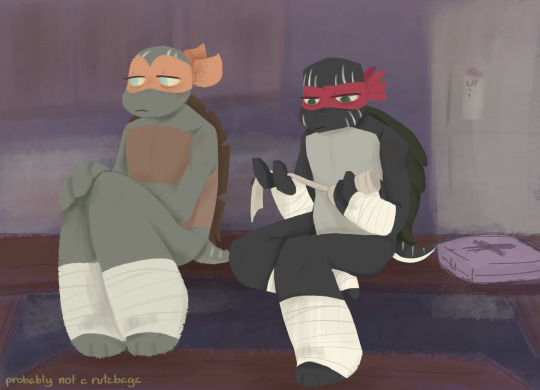
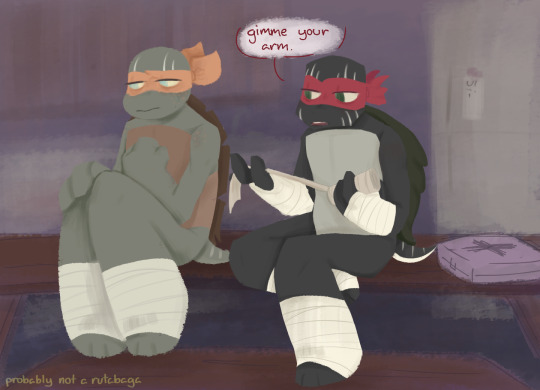

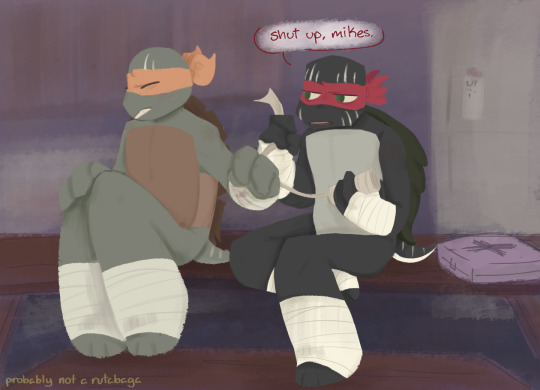
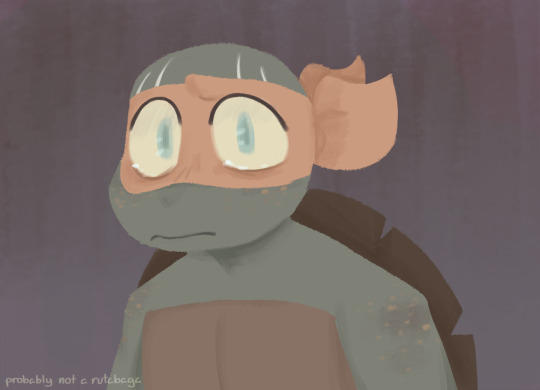


this has been on my mind since i started planning the farmhouse arc,,, was just a little nervous to actually do anything with it
#rutabaga art#tmnt aberration#teenage mutant ninja turtles#tmnt#tmnt iteration#tmnt raph#tmnt mikey#tw sh implied#tw sh#PLEASE LMK IF I NEED TO BE MORE SPECIFIC WITH TAGS OR ADD MORE WARNINGS#i wanna do everything i can to make sure people can still enjoy aberration even if this is smth that makes them uncomfortable- yk???
503 notes
·
View notes
Text
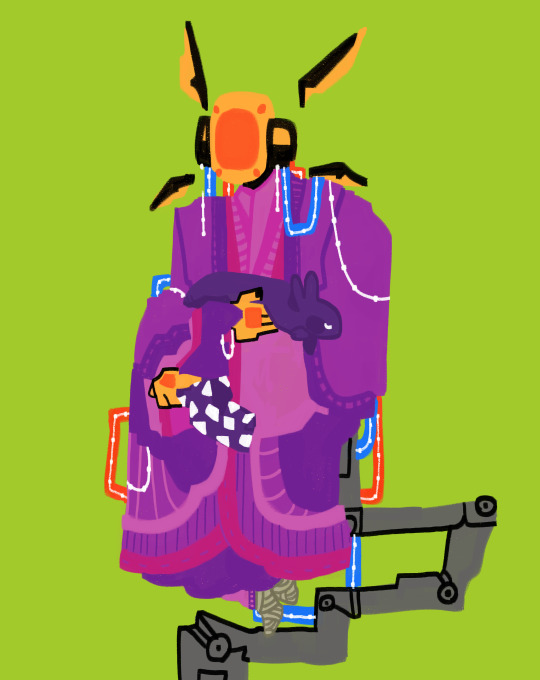
thinking about portraits of young ladies with their cats. and Also suns robes
#rain world#seven red suns#spearmaster#they are my babygirl and they desvere everything ever me thinks (both suns and spearmaster)#im having fun with iterators robes again yippe!!!!!#also sm got so smoll im so sosrry baby why you look like that im sorry#anyhow anyhwo i had fun#man i miss doing lineaart imdidlty i should dra mor elineart#but this is nice too i gues.....#also i will say last nigth i fougth every insict ever to not draw suns in the middle of the igith necaus ei rememebred my own art of this b#g i love them so much their great#anyhow anyhow!!#we are listning to roomates by malcome todd#also can anyoen tell ive been into xianxia stuff again??? just me ahem ayeha#!!#oh my god i forgot the fandom tags i need to add those wops#srs#tw bright colors#just to be safe!!!!
290 notes
·
View notes
Note
Hey, Yuri, do you think Yuu would ever run the risk of being put in danger by having a romantic relationship with any of the more high-profile members of the cast? I mean, we’ve got royalty, nobility, celebrities, and the very wealthy attending this school. I’ve just been rotating my brain about how these relationships would work out and Yuu is a pretty vulnerable target without NRC’s security. - 🦐
Hmmmmmm. I have a bunch of thoughts about this actually... I tried ranking them from least to most dangerous if that makes sense? But don't read too deeply into the bullet point placements they were mostly just a stream of consciousness thing.

Not that Risky (surprisingly)
Leona- we don't really have details about his brother's marriage, but I don't think his family has been shown to be overly keen on forming alliances with outside countries, the Savannah seems more concerned with itself. I don't think his family would be too fussed with his partner being a magicless person from outerspace, if anything this might be seen as a plus to the councilors that are always mocking Leona behind his back as his partner's lack of royal blood makes him even less fit for the throne. Not to mention Leona himself is more than enough to protect Yuu, he's the only royal at the school without a proper retainer (which you could argue is because no one at home likes him) but I doubt his family would let him do that if he was genuinely in danger.
Rook- he's Rook. His family does sound rather sweet from the very very very little we know about him (he also seems like he was kind of sheltered as a kid, something I should chew on sometime) so I doubt they would allow anything too bad to happen to Yuu.
Vil- his main issue is his contract, the Japanese Idol industry is cut throat and often sees things like bans on relationships as part of the contract. Vil doesn't want to risk his career or reputation, he mentions that he himself is a brand and I can't see him wanting to put that pressure on Yuu if they're not up for it. But... there are also celebrities who have really private personal lives and I sort of get the sense Vil is like that? And I don't think he would be too bothered if Yuu didn't want to be super public, it would certainly make it easier to keep you safe.
Idia- S.T.Y.X. might be a gloomy place but no one knows where it is
Medium Danger (danger is real but can be managed)
Jade and Floyd- we don't actually know what their family does, just that it's probably sketchy and that Mama Leech calls them every day, taught them self defense, and just generally seems to worry about them a lot. The danger is very real under the sea, but I also sort of get the sense that messing with the Leech family is skipping the fuck around and going straight to find out.
Azul- his business is going to make him enemies sooner or later, but at least during school Yuu should be more or less safe. Azul's able to keep on top of the students who mean Yuu harm, and Yuu is able to politely ignore their boyfriend's business (or maybe they have a knack for helping?) When you get older I can see Azul's need for a security team expanding, but he'll have money to get the best.
Riddle- ok so. I don't think his mom would try to kill you. But god she would be such a toxic person to manage. I'm actually working on a (very old) request atm that involves discussing what Riddle's mom might do if she finds Riddle with a partner instead of his studies (which I assume she's paying for) especially during his internship. She'd go full scorched earth and get very confused when Yuu doesn't back off like Trey did.
Huston We Have a Problem
Kalim- the amount of assassination attempts my poor boy has already canonically endured... I imagine there are probably going to be more in his future. I can see Yuu needing their own retainer (which could be a fun concept for an oc) to protect them and test their food. When Grim becomes a great mage I'm sure he could help with that actually, wouldn't that be cute?!
MALLEUS- acceptance of humans is virtually non existence in Briar Valley AND his mother hated humans so much she "blessed" her child to only be loved by fae. We don't actually know how the senate works but I imagine they would lose their ever loving shit if Malleus brought home a human as a friend and now he wants to make them his spouse? No. They say no. Time to show them what an absolute monarchy means I guess.
Assuming Yuu isn't in a relationship with Malleus I could see their friendship actually sort of being a boon to them, especially if Yuu was with Kalim or Azul. Pissing of the merchants is one thing, but the King of the Abyss? No thank you, they'll just take their losses and go.
#<3 asks#twisted wonderland x reader#twst x reader#shrimp annon#it took everything within me to not add rollo to this list because we don't know if his family has money or not woirebtnoiewnrgoiewsmnygpi#lore in the tags for people who read it: i made some ocs for the fyuuture kid au#one of which was a retainer for the al asim family#who worked for a sibling of kailm's and was a friend of yutu's when he came to twisted wonderland
379 notes
·
View notes
Note
do you have a masterpost of "ty lee comes from crypto-air nomad" posts? I'm fascinated by this idea and want to read everything I can but I can't find where it started 😭
i feel like this is a question better posed to @kyoshi-lesbians, who, at least in my book, is the leading expert in ty lee studies (among other things). that said, i can definitely synthesize the argument (and why i find it cogent and persuasive), even if i don't actually know from where the theory originated (but i'm sure that if you look up "ty lee air nomad you'll immediately be directed to an old reddit page or fan forum from years ago; it's a "theory" that goes way back).
firstly, ty lee's appearance is distinctly "air nomadic" in a way no one else's is. save for aang, of course. she and aang do bear an uncanny resemblance. everyone else in the fire nation has yellowish brown eyes, for example, while ty lee, like aang, has charcoal greyish brown eyes. and they also have similar (round and cute) facial features, similar expressions, similar vibes. similar dispositions...
ty lee does not "have the personality" of a ruthless fire nation soldier, despite acting as the princess's right hand who takes out more opponents than pretty much everyone else put together. ty lee acts like an airbender, flirty and flighty. her relentless optimism and goodwill and cheer is decidedly a mask, but it is a mask she adopts adeptly. even if she is performing, she nonetheless performs the "aang" function of her respective group.
ty lee presents herself as more spiritually attuned than other people in the fire nation, who outright disrespect the spirits and spirituality. her constant talk of auras is likely a calculated move on her part, as nearly everything is, to make her seem silly and trivial, because she thrives best when she goes underestimated. but her talk of auras also has to come from somewhere, and seeing as literally no one else mentions auras once throughout the entire show, ty lee's sources are clearly scarce.
ty lee also fights like an airbender. despite generally taking the offensive, ty lee nonetheless exhibits a graceful, acrobatic quality when in combat. she never kills anyone either, merely incapacitates them momentarily. and when she is faced with stronger than typical opponents, she usually relies on her skills as an acrobat by taking the aerial advantage. note her ability to jump incredibly high, such as in "the chase," or her ability to run along a moving cable wire in "the boiling rock." ty lee's skills go beyond merely being a good acrobat. she's incredible. and perhaps even exhibiting some latent airbending skills she inherited from her ancestors.
ty lee's air nomad ancestry coheres really well with her arc as a character. imagining that her family of genocide survivors hid in the heart of the fire nation and assimilated into the imperialist culture that sought to exterminate them makes her own role that much more impactful. there's already a beautiful parallelism to the fact that ty lee is an acrobat and performer who contorts herself to suit the desires of others and performs obsequious loyalty for her own survival, but an extra layer of depth is added if she's also assimilating into the royal court by reducing herself and hiding her true feelings and motivations, just as her family did.
i see ty lee's ancestors as having assimilated into the imperial core out of fear, but over the generations, genuinely being subsumed into fire nation culture, with the desire to social climb a natural extension of their patriotism. but there are also still facets of ty lee's ancestry, whether genetic or otherwise, that have remained in traces. the generational trauma, for example, definitely reflects why her parents had so many children. and the fact that she's constantly torn between two worlds, as a genocide survivor who also directly serves the imperialists who murdered her ancestors, represents her internal struggle as someone who desires freedom of expression and the choice to assert her individuality, but is also forced through circumstance into lying and deflecting and manipulating (which, to be honest, is also the air nomad way) for the sake of survival.
surviving is ty lee's number one priority, in a way it just isn't for mai. mai and ty lee both come from social climbing families (although i've always assumed that mai's family is far wealthier than ty lee's) but mai is also depressed and frustrated and bored out of her mind. and even though she was raised in a family that forced her to don a mask and reduce herself and perform a passive model of femininity, she also has no problem stating aloud how she's feeling and what her limits are (with the exception of when azula gives her a veiled command as a test, and mai has no choice but to obey).
mai has the privilege of knowing that the stakes don't really matter, which she all but states when she claims that she grew up in luxury and opulence, and always had everything handed to her. which isn't to say that she led a perfect, easy life. she wouldn't be as depressed and repressed as she is if there weren't factors actively harming her, but she still chooses to join azula by choice, even if it's really only the illusion of choice between two awful options, whereas ty lee has to be coerced through violence.
mai kind of has a "fuck it we ball" attitude and doesn't really seem to care about her own safety (if anything, she's more concerned with comfort), whereas ty lee would do anything to ensure her survival. and that kind of mentality illustrates how she differs from most of the fire nation elites, who were inculcated into imperial privilege and never really considered what prioritizing survival even entails (zuko learns that lesson the hard way). ty really exhibits the mentality of the genocide victim/colonized subject through her prioritization of survival in the face of what to mai is a problem, but to ty lee is an existential threat.
whether or not ty lee even recognizes that her desperate desire to live comes from a place of generational grief and trauma is another story, but i do think there is something to be said for the fact that descendants of genocide survivors can feel that grief as it has been passed down to them. i think ty lee feels it, and i think that it motivates her to do whatever it takes to live, because above all, she is a survivor. and even if she has to assimilate and manipulate and cut away every part of herself that's real and authentic and true, she will do it (until she doesn't). and that's also, incidentally, what makes her such a great foil to aang.
#i hope this answers your question!#anachronornis#asks#analysis#ty lee#maixtylee#aang&tylee#aang#mai#air nomad ty lee#i should make that a tag....#also river if u have anything add please feel free#i love ty lee she is the specialest insane girl she is everything
196 notes
·
View notes
Note
can i req some arlecchino kink headcanons? no pressure to answer! there's just a lack of new knave content lately ahhh.. ( ̄ヘ ̄)

{☆} characters arlecchino
{☆} notes drabble, hc's, gender neutral reader
{☆} warnings 18+ content
{☆} dacryphilia
arlecchino is a sucker for crying. doesn't matter if you cry easily or not– either she sees it as a challenge to make you cry in the first place or to see how much you can cry before you have to tap out. her absolute favorite way to make you cry is straight up overstimulating (or understimulating you, depending on her mood) until you're practically sobbing. if you cry prettily enough maybe she'll take pity on you.
{☆} temp play
arlecchino has a pyro vision and she is absolutely going to use it. especially prominent if you're both in snezhnaya– it provides prime opportunities for her to slip her hands under your clothes when you least expect it just to see you squirm beneath her hands. she'd never actually do anything too scandalous in public, but if you're a bit more hidden away she'll have no qualms playing with your chest. if you complain about the cold you're just giving her an excuse to "warm you up" and see you tremble like a lamb.
{☆} face sitting
nothing prettier to her then seeing you above her with her face between your legs. her tongue is just as warm as any other part of her, and she knows how to use it, too. she'll hook her arms around your thighs just to hold you down until you've doubled over from the intensity of it– if you start crying, oh, she just gets worse. absolutely ravenous. she won't stop even if her jaw starts to ache. if you don't want her to stop, she could go for hours without a break.
#genshin impact smut#genshin smut#arlecchino x reader#arlecchino smut#writing tag#genshin impact x reader#genshin x reader#minors dni#asks#anon#i would pref if men didnt interact w this but im not gonna go out of my way 2 do a background check lol#considered for the briefest moment on adding breeding kink to this but i had to physically restrain myself i add it to EVERYTHING#arle breeding kink but w/o the actual breeding she has enough little bastards 2 deal w u get me#its abt the Idea. the Concept.#if u thought id stop adding 300 random tags yapping ahahaha no.#also considered overstim but thats a given. BORING.#also me?? actually using this blog???? yeah lol#if my mutuals see this look away im having a moment#i havent slept at all its like 4 am if theres a typo or smth i forgor look away
354 notes
·
View notes
Text
Saxaphone player Gallagher has not left my mind since the jazz night art dropped AND THEN Robin saying Halovian’s innately have good voices and Sunday used to hum lullabies to her as kids happened in the 2.2 special program, and I’m sure you guys can see where my unfortunate Galladay heart is going with this.
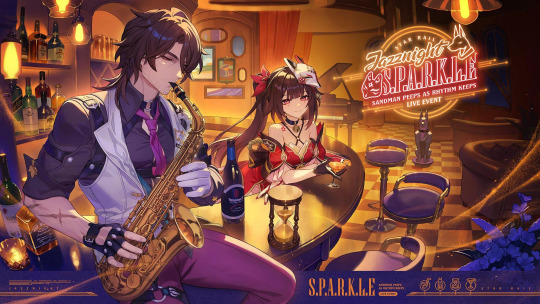
Whoever decided to make this art, I love you. I hope your pillow is cool every night, you’re never stuck in traffic, and your water is refreshing with every sip.
Also the art of Sunday with the White Gentlemen drink in the S.P.A.R.K.L.E jazz night event has also spiraled into me delusionally thinking that’s his go to drink. Which is hilarious since Robin has hinted before that he seems to have a massive sweet tooth in her letters.
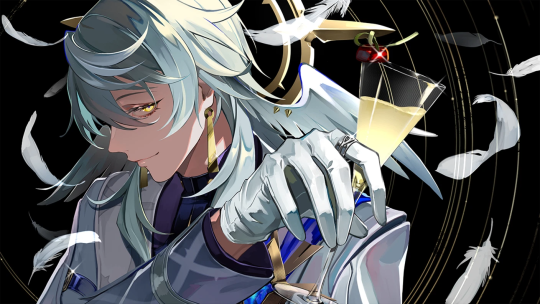
(Sunday how do you even make holding a drink menacing, Sunday please get some therapy-)
So imagine this:
Pre 2.0 Galladay, where they’re both wary and suspicious of each other but didn’t do anything outright. Sunday slowly began to visit Gallagher’s bar whenever he had time to observe the Hound, initially on the down low just to get a sense of what he was working with and what to keep an eye on. He always gravitated to that one corner booth that every bar had with the most privacy, and just stalked there for a few hours before leaving. (Smol menacing birb in a tree vibes)
Gallagher obviously knew that Sunday was doing this (even though everyone else seemed to somehow completely miss him, Gallagher wouldn’t be surprised if Sunday was doing some weird Harmony mind tricks), and after the first few “stakeouts,” he bit the bullet and actually approached the table to engage with Sunday, on the off chance this was some weird “test of loyalty” by the Halovian to see if the Hound would swallow his pride to serve his so-called masters.
Nothing terrible happened, but he remained passive-aggressively polite when serving him, and Sunday remained passive-aggressively cool-headed in response. There was some snark of what dear “sweet-toothed” Sunday would want at a bar, and an icy reply of “aren’t you the master drink smith? Why don’t you show me those skills you boasted about?” which led to Gallagher being petty and giving Sunday the White Gentlemen drink, both for the story behind it being such a metaphor for Sunday, and because it was on the more bitter side of alcoholic drinks.
Sunday wasn’t too against the drink; it wasn’t something he would have ordered if it had been his choice, but it wasn’t a bad drink by any means. He couldn’t help but continue to drink it even after Gallagher left his little hidey booth to go back to the main bar, but he’d never stoop so low as to complement the Hound. Of course, he never ordered anything else from then on, only White Gentleman. In fact, over time it seemed to slowly get better, the flavors grew on him, and he couldn't help but look forward to it during difficult nights in the Dreamscape.
If Gallagher tried to needle him into a different drink, Sunday just bit back a “oh? Admitting defeat? I thought this was your best drink for me?” with a little smirk while Gallagher had to use every bit of self-control to not punch him in the face.
As time went on, the bar slowly became a place Sunday frequented to not quite relax, but to get away from the hustle and bustle of Penacony and his duties as one of its main faces. The stresses slowly started piling up, especially with the Charmony fast approaching in a few months and all that came with it.
Gallagher didn’t seem to loosen up regarding his attitude with Sunday, but he did get better at shoving down the visceral hatred he had for everything to do with The Family and Sunday as time went on. He didn’t get soft with Sunday per se, but he definitely kept an eye out for him, and definitely knew when to cut off his drinks on days where it seemed that Sunday wasn’t all that there for their usual veiled comments towards one another when he went to serve him his drink.
It started small, with Sunday staying later and later until sometimes he was the last one to leave the bar to return to reality. Gallagher wasn’t quite sure what to make of it, still wasn’t quite sure this wasn’t some weird long-term test Sunday was devising, especially since he still seemed to be the same ruthless Family member, the same Head of the Oak Family, when Gallagher was working as a Bloodhound outside the bar. For some reason though, within the enclosed space of this strange sanctuary, it was almost peaceful between the two.
One night, there was something wrong when Sunday entered the bar during Gallagher’s shift. He saw a bit of a crowd near the small stage that was within eyesight of his little hidey booth, it seemed some of the musicians of the live band were arguing? He watched as Gallagher came over, seemed to try to speak with the group before honing in on one of the musicians who had been making the most noise and seemed to be about to get physical with the rest. Sunday watched as Gallagher picked up the musician by the scruff of their suit with one hand and carried them towards the doors and lightly tossed them out.
(It was the first time Sunday had actually seen Gallagher perform anything resembling the actual duty of a Bloodhound. It only hit him that he’d only ever seen the other when giving reports, orders, or at the bar. Why was this so shocking to him, he’d seen the man’s arms before, hard not to with his slovenly dress and messy clothing style, as if he couldn’t bother to hide away his imperfections from the world, not like Sunday who refused to be seen by the world, to dare to show one thing off about himself despite his countless failings- he’s getting far too distracted by one meager showing of strength, focus Sunday)
There had always been a live music segment. Sunday was curious to see what would happen with the band missing a member, but was distracted by Gallagher placing his usual White Gentlemen in front of him before heading back to the musicians without a single word to him. Gallagher took a moment to speak with the rest of the band, who seemed to be coming out of their shock and took on worried looks. Sunday could only watch in muted shock as Gallagher went behind the bar and came back with a case, opening it to reveal a saxophone. He then went on stage with the rest of the group, positioned himself further to the side and in the back amongst the shadows within Sunday’s line of sight, and played with the band for the rest of the night.
Sunday couldn’t look away.
He was frozen as he watched Gallagher seamlessly transition from song to song, taking only small breaks to continue serving the other patrons before heading back in. Sunday only remembered about his own drink when his gloves began to get wet from the ice melting into condensation on his glass.
Something felt off within Sunday, and for the first time since Robin’s debut, he couldn't help humming to the music of the band, music that wasn’t of his own sister’s making. He couldn’t help but remember those little concerts the two would have, taking care of his little sister, his only world. He would do anything to keep the Harmony, to keep their family going. When was the last time they truly spent time together? Before he became the Head of the Oak Family? Before he couldn't recognize his own smile?
He was so lost in his thoughts, in memories he thought he buried, that he didn’t realize that it was once again closing time, and he was once again the last one left. He only snapped out of it when Gallagher came by to grab his empty glass, only quirking a questioning brow at him before heading back to the bar.
Gallagher had been keeping a quiet eye on the Halovian that night from the back of the band, in the shadows he felt the most comfort in when in the Dreamscape of Penacony. He had watched Sunday’s eyes glaze over, and the only reason he hadn’t felt offended by the seeming disinterest was the look in the other man’s eyes reminding him of his own when he looked in the mirror. The same look of shame, regret, loss, longing, of the wishes to regain everything he had lost. The same look he strove to hide under every bit of the facade he had crafted of this new self, but came back all too often with every reference of the Family found within his prison in the Dreamscape.
Maybe it was the shared nostalgia within his own heart, that little bit of his true self that he thought died when the Family tore out everything that made him who he was, that made him return behind the bar and begin making Sunday another White Gentlemen, giving Sunday a small nod to beckon him over. He wasn’t expecting anything from it, and he masked his own surprise when Sunday actually left his little shelter to come and take a seat in front of him at the bar. Even while out of it, Gallagher made note of the quiet confidence the other still carried himself. Nothing seemed wrong to anyone else looking at him, only for the lost look in his eyes.
The first time in the many months that they’ve been skirting around each other, and finally they seemed to be face to face.
It was quiet as Gallagher made Sunday his usual drink, a drink he had been slowly changing over the months to be sweeter and sweeter that Sunday never quite seemed to notice, or if he did, he never said anything, only seeming to savor it more each subsequent night. Maybe not even Gallagher noticed his own changes to the drink, subtle as they were.
It was quiet as Sunday took the finished drink, and it was quiet as his eyes slid over the bartop to see the saxophone case laying open with the instrument inside. It was quiet as Gallagher followed his eyes, as he came out from behind the bartop to take the saxophone out and take a seat in a chair only one seat down from Sunday’s. It was quiet as Gallagher began to play to his audience of one.
It was quiet as Sunday quietly hummed along.
It was quiet as they both knew that it would not last.
OK yea so this was all because I heard ‘La vie en rose’ at the end of the Jazz night event and went “Damn I wish that’s Gallagher playing on his Sax” and then we spiraled.
Uh. Idk what it is with me having a small ship moment which then spirals into a full blown writing session. My mind blanked out and as I came to I find out that I made a whole ass little one shot over here then completely forgot about it WHOOPS
So yea, hope my fellow Galladay enjoyers… enjoyed! I think I’ve slowly begun to crave… not domestic or fluff per se from these two, but after every AO3 fic being super dark between them (which I get! They are the toxic yaoi kings of Penacony as of writing this, no one is denying that!) I think I want to see them be explored in a more melancholic sense. Not quite the “forbidden” love angle, but in the “damn we kinda have some parallels, and maybe in another life we could have gotten along but there’s too much baggage and anger, both historically and currently to really even try anything”
I have this feeling this may not be the last time I write about these two… is Galladay going to be the ship that gets me to actually use my AO3 account?
#hsr#honkai star rail#hsr gallagher#hsr sunday#galladay#idk what I’m doing anymore#they’ve kinda taken over my mind#shoutout to that one ao3 fic where both of them go “’this wasn’t supposed to happen’ as they’re making out#that’s the exact vibes I’m feeling when I think about these two pre-relationship#of course we don’t run away from angst in this ship#everything follows exactly up until the 2.1 end credits scene#let’s see what happens in 2.2#I NEED ANSWERS#ALSO MISHA#I WANNA THROW GALLAGHER AND MISHA’S KINDA WHOLESOME RELATIONSHIP IN HERE TWO#idk wtf is going on there#but until 2.2 explains#Gallagher is misha’s weird drunk uncle/dad figure#it adds more comedy to Galladay whether Sunday knows of/can see Misha or not either way#oof new writing idea#next time#I need to work on tagging#this is just another post all on its own#marrapost
168 notes
·
View notes
Text
just an appreciation post for the turtles take time and space short <3
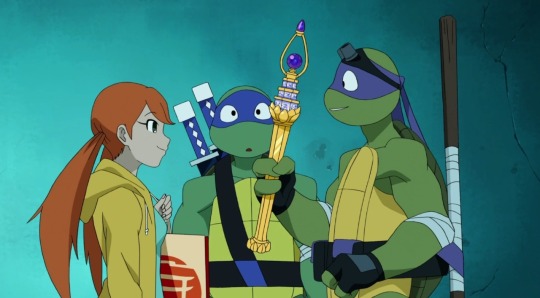
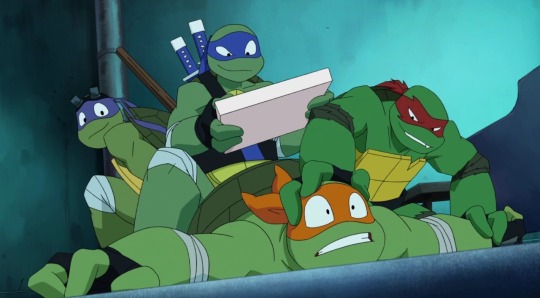

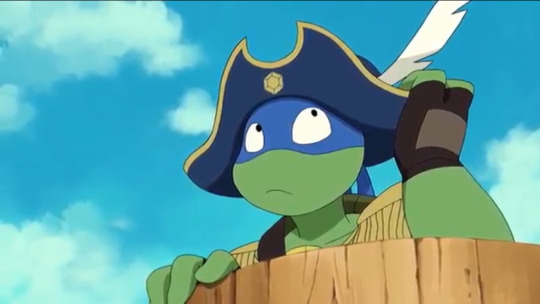
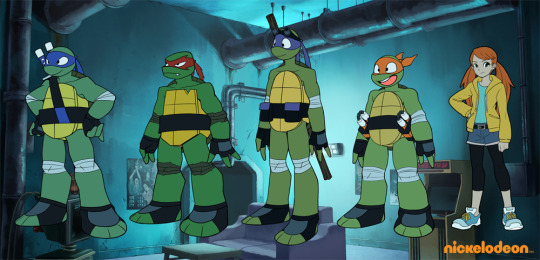
#everything about this was perfect… ALMOST….#they just needed to add in mikeys freckles and it would have been perfect TO ME#no but this animation and style is so so cute i want to EAT THEM LOOK AT THEM!!!!#tmnt 2012#tagging as 2012 because it’s basically them. right? ik it’s a short but like in my eyes. they’re the 2012 boys
612 notes
·
View notes
Text
slight spoilers for the new ovenbreak event but these sprites are killing me there is something deeply wrong with them
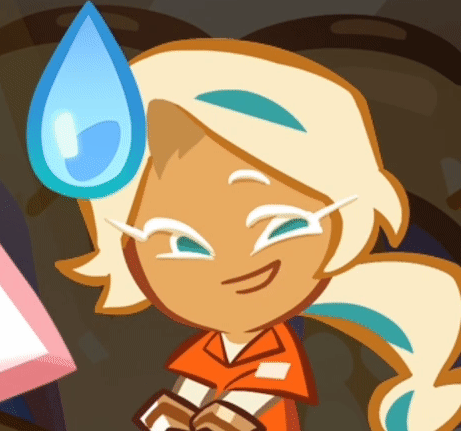



#✁ | afternoon tea rambling | ✃#THEY ARE SO FUNNY TO ME#like whats wrong with you#I totally didn't speedrun this event just because it contained rogue.....#(insanity)#tbh ill add the chara tags just so I can find this later in my stuff (even if I organize with tags I lose EVERYTHING goddamn)#cookie run ovenbreak#roguefort cookie#i really have to draw them eventually-
482 notes
·
View notes
Text
compiled a list of some of my favorite text-based games & VNs that are specifically wlw:
another round - You play as Maddie, a woman in love with a woman named Agnes. Actually, she hates her. Actually, it's complicated. You definitely broke things off with her. And you don't regret it. At least once. Yes. At least once per day, you don't regret ending it with Agnes. Except tonight. You definitely regret it tonight.
such, such were the joys - It is the year 19xx in England. You are returning to the town of Grayling after your first year at university to meet your old school friends: Cicily Thomas, Fatima Khan, and Susheela Rajaram. As the only Indian girls at Grayling Towers, the four of you quickly became close friends, but you haven't seen each other in a year. You're not sure what has changed since then, but this is your chance to find out.
florence - Florence lies in bed, cold and still. You watch over her and wait.
perseids, or, all this will go on forever - Four trans girlfriends go on a road trip to a dark sky park, to see the perseid meteor shower.
winter - an interactive fiction about sex, trans insecurity, and a girl with a skull for a face.
butterfly soup 1 & 2 (VN) - A visual novel about gay Asian girls playing baseball and falling in love.
birdland - At night 14-year-old Bridget Leaside dreams of fantastic lands full of strange bird people. By day she's a miserable anxious summer camper, trying very hard not to think about her feelings for the mysterious girl detective in Cabin 22. And when her dream life starts bleeding into reality, things are going to get weird for her in a whole bunch of ways...
a summer's end: hong kong 1986 (VN) - Follow the story of Michelle and Sam, and how their chance meeting evolves into a deeper romantic relationship. Set in vibrant Hong Kong in the year 1986, it is an original story about love, family, and culture.
one day hike - You go on a hike in a familiar wood.
a year of springs (VN) - experience the stories of haru, erika, and manami in A YEAR OF SPRINGS, a visual novel trilogy about a trio of friends navigating their feelings of love, connection, and just wanting to belong.
pageant - Your name is Qiuyi (Karen?) Zhao, and you’ve just been signed up by your parents for a beauty pageant. You’re not ready, not even close, but you don’t have a choice. But perhaps you can make the best of it.
new year's eve, 2019 (sequel to pageant) - You are Karen Zhao, a senior in college who is home for winter break, and seeing your old high school friends for the first time in years. You are not ready, not even close, but perhaps you could make the best of it.
the revenant's lament - Way out west, in the most lonesome of reaches, strange things are afoot. Cowboys around campfires tell ghost stories and tall tales, speak of impossible, supernatural things. They say the devil walks amongst men. They say he'll grant you impossible wishes at the cost of your eternal soul. They say he can bring dead men back to life.
venus meets venus - Two women meet in a bar. This is not a love story.
#yes i put my own game on this list. sue me#anyways i know there are like a billion yuri games on itchio so this is a highly curated list#excluding dating sims and yuri VNs cus they're incredibly easy to find like just go in the yuri tag lmfao#interactive fiction#games#also most of the creators on this list have more games too that i recommend#draw everything here that's me and you (?) something like that by kaleidofish#anamika has quite a few games besides florence and such such were the joys#there's another sequel to pageant and new years 2019 & the archivist by autumn chen#npckc has a shit ton of games lmfao#there are some sequels to birdland too but ive never played any of those#communistsister has a massive catalogue of games and collabs with domino club#anyways. these are just some of my favorite creators#and some of their games that i really liked#i might add on to this but im having a hard time focusing to read games lately i only just finally read revenant's lament last night#so i could put it here. brigid your game will haunt me forever (affectionate)
269 notes
·
View notes